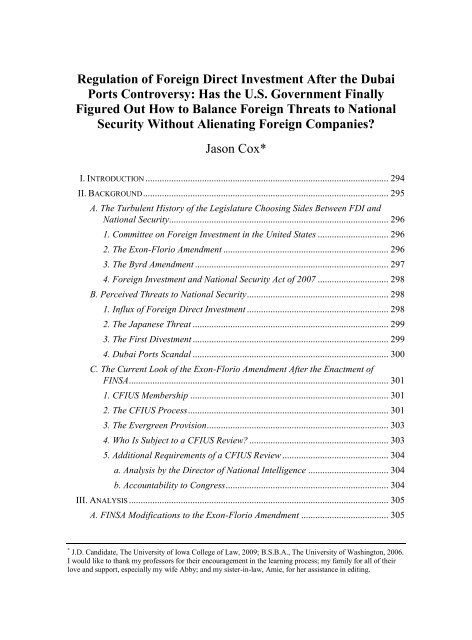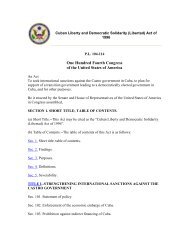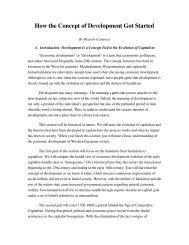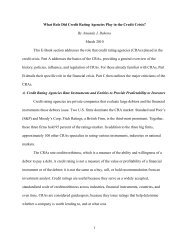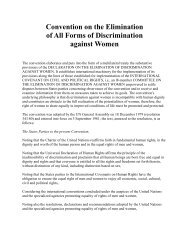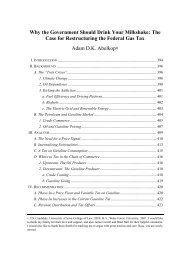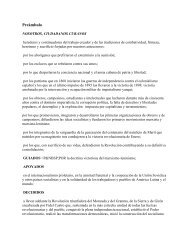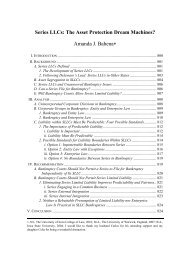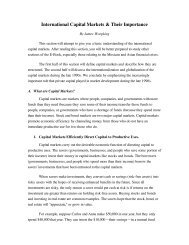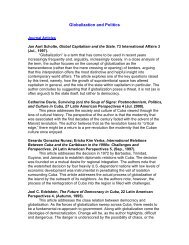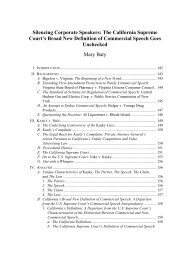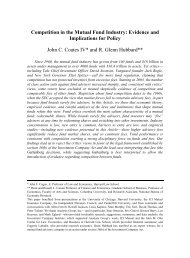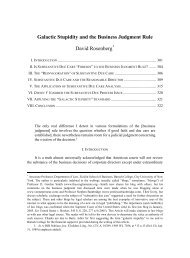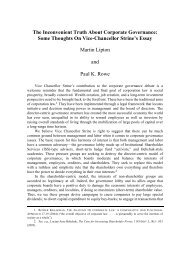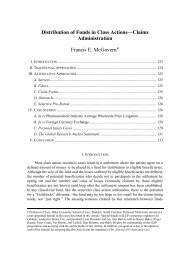Regulation of Foreign Direct Investment After the Dubai Ports ...
Regulation of Foreign Direct Investment After the Dubai Ports ...
Regulation of Foreign Direct Investment After the Dubai Ports ...
You also want an ePaper? Increase the reach of your titles
YUMPU automatically turns print PDFs into web optimized ePapers that Google loves.
<strong>Regulation</strong> <strong>of</strong> <strong>Foreign</strong> <strong>Direct</strong> <strong>Investment</strong> <strong>After</strong> <strong>the</strong> <strong>Dubai</strong><br />
<strong>Ports</strong> Controversy: Has <strong>the</strong> U.S. Government Finally<br />
Figured Out How to Balance <strong>Foreign</strong> Threats to National<br />
Security Without Alienating <strong>Foreign</strong> Companies?<br />
Jason Cox*<br />
I. INTRODUCTION ....................................................................................................... 294<br />
II. BACKGROUND ........................................................................................................ 295<br />
A. The Turbulent History <strong>of</strong> <strong>the</strong> Legislature Choosing Sides Between FDI and<br />
National Security............................................................................................. 296<br />
1. Committee on <strong>Foreign</strong> <strong>Investment</strong> in <strong>the</strong> United States .............................. 296<br />
2. The Exon-Florio Amendment ...................................................................... 296<br />
3. The Byrd Amendment .................................................................................. 297<br />
4. <strong>Foreign</strong> <strong>Investment</strong> and National Security Act <strong>of</strong> 2007 .............................. 298<br />
B. Perceived Threats to National Security ............................................................ 298<br />
1. Influx <strong>of</strong> <strong>Foreign</strong> <strong>Direct</strong> <strong>Investment</strong> ............................................................ 298<br />
2. The Japanese Threat ................................................................................... 299<br />
3. The First Divestment ................................................................................... 299<br />
4. <strong>Dubai</strong> <strong>Ports</strong> Scandal ................................................................................... 300<br />
C. The Current Look <strong>of</strong> <strong>the</strong> Exon-Florio Amendment <strong>After</strong> <strong>the</strong> Enactment <strong>of</strong><br />
FINSA .............................................................................................................. 301<br />
1. CFIUS Membership .................................................................................... 301<br />
2. The CFIUS Process ..................................................................................... 301<br />
3. The Evergreen Provision ............................................................................. 303<br />
4. Who Is Subject to a CFIUS Review? ........................................................... 303<br />
5. Additional Requirements <strong>of</strong> a CFIUS Review ............................................. 304<br />
a. Analysis by <strong>the</strong> <strong>Direct</strong>or <strong>of</strong> National Intelligence .................................. 304<br />
b. Accountability to Congress ..................................................................... 304<br />
III. ANALYSIS .............................................................................................................. 305<br />
A. FINSA Modifications to <strong>the</strong> Exon-Florio Amendment ..................................... 305<br />
* J.D. Candidate, The University <strong>of</strong> Iowa College <strong>of</strong> Law, 2009; B.S.B.A., The University <strong>of</strong> Washington, 2006.<br />
I would like to thank my pr<strong>of</strong>essors for <strong>the</strong>ir encouragement in <strong>the</strong> learning process; my family for all <strong>of</strong> <strong>the</strong>ir<br />
love and support, especially my wife Abby; and my sister-in-law, Amie, for her assistance in editing.
294 The Journal <strong>of</strong> Corporation Law [34:1<br />
1. The Introduction <strong>of</strong> <strong>the</strong> CFIUS Lead Agency .............................................. 305<br />
2. Mandatory 45 Day Investigation <strong>of</strong> Acquisitions Involving <strong>Foreign</strong><br />
Governments............................................................................................... 306<br />
3. Defining National Security to Incorporate Issues Pertaining to<br />
Homeland Security Including Its Application to Critical Infrastructure<br />
and Critical Technologies .......................................................................... 307<br />
4. Unilateral Initiation <strong>of</strong> Review <strong>of</strong> Any <strong>Foreign</strong> Acquisition by Any<br />
Member <strong>of</strong> <strong>the</strong> CFIUS ................................................................................ 309<br />
5. Including an Analysis by <strong>the</strong> <strong>Direct</strong>or <strong>of</strong> National Security <strong>of</strong> Any<br />
Proposed Threat ......................................................................................... 309<br />
6. Addition <strong>of</strong> <strong>the</strong> Evergreen Provision to Completed Reviews ....................... 310<br />
7. Increased CFIUS Accountability to Congress ............................................ 311<br />
IV. RECOMMENDATIONS ............................................................................................ 311<br />
A. Removal <strong>of</strong> <strong>the</strong> Mandatory Investigation <strong>of</strong> <strong>Foreign</strong> Government-<br />
Controlled Transactions.................................................................................. 312<br />
B. Creation <strong>of</strong> a Separate Committee to Review All FDI Transactions and<br />
Initiate CFIUS Reviews ................................................................................... 313<br />
C. Rework <strong>the</strong> Evergreen Provision to Only Include Intentional Fraud by <strong>the</strong><br />
Parties to <strong>the</strong> Covered Transaction ................................................................ 313<br />
D. The Nature <strong>of</strong> a CFIUS Review Requires More Secrecy Than Allowed by<br />
FINSA .............................................................................................................. 314<br />
V. CONCLUSION ......................................................................................................... 315<br />
I. INTRODUCTION<br />
Congress has consistently struggled with balancing regulation <strong>of</strong> foreign direct<br />
investment (FDI) so as to protect <strong>the</strong> national security <strong>of</strong> <strong>the</strong> United States while<br />
promoting foreign investment that improves <strong>the</strong> U.S. economy. Congress has <strong>of</strong>ten<br />
enacted <strong>the</strong>se FDI regulations in response to a real or perceived threat to national<br />
security. Congress passed <strong>the</strong> latest installment <strong>of</strong> FDI regulation, <strong>the</strong> <strong>Foreign</strong> <strong>Investment</strong><br />
and National Security Act <strong>of</strong> 2007 (FINSA), and it became effective in October 2007. 1<br />
Part II <strong>of</strong> this Note examines <strong>the</strong> history <strong>of</strong> <strong>the</strong> specific laws that Congress has passed to<br />
regulate FDI, <strong>the</strong> threats to national security that prompted congressional action, and <strong>the</strong><br />
details <strong>of</strong> <strong>the</strong> current law after FINSA.<br />
FINSA made seven major changes to <strong>the</strong> existing FDI regulation. Part III details <strong>the</strong><br />
FINSA modifications to existing FDI regulation. This Note scrutinizes each <strong>of</strong> <strong>the</strong> seven<br />
changes, examining <strong>the</strong> congressional intent behind <strong>the</strong> changes and <strong>the</strong> likely result<br />
<strong>the</strong>se changes will have on future FDI in <strong>the</strong> United States.<br />
1. <strong>Foreign</strong> <strong>Investment</strong> and National Security Act <strong>of</strong> 2007, Pub. L. No. 110-49, 121 Stat. 246 (amending<br />
50 U.S.C. app. § 2170 (2000)). FINSA is <strong>the</strong> latest statute passed by Congress in a continuing effort to monitor<br />
FDI that could affect national security.
2008] <strong>Regulation</strong> <strong>of</strong> <strong>Foreign</strong> <strong>Direct</strong> <strong>Investment</strong> 295<br />
Finally, in Part IV, this Note formulates four recommendations intended to make<br />
future FDI regulations more business friendly to foreign investors without sacrificing <strong>the</strong><br />
ability <strong>of</strong> <strong>the</strong> U.S. government to monitor transactions that could impair national security.<br />
Congress should adopt <strong>the</strong> following recommendations when drafting <strong>the</strong> next statute that<br />
addresses FDI: (1) remove <strong>the</strong> mandatory investigation <strong>of</strong> foreign government-controlled<br />
transactions, (2) create a separate committee in addition to <strong>the</strong> Committee on <strong>Foreign</strong><br />
<strong>Investment</strong> in <strong>the</strong> United States (CFIUS) to instigate CFIUS reviews, (3) rework <strong>the</strong><br />
evergreen provision to create a stronger res judicata effect on companies that voluntarily<br />
submit <strong>the</strong>ir transactions to CFIUS reviews, and (4) give <strong>the</strong> CFIUS more power to<br />
protect <strong>the</strong> secrecy <strong>of</strong> <strong>the</strong> information ga<strong>the</strong>red in a review.<br />
II. BACKGROUND<br />
<strong>Foreign</strong> investment has been an extremely important part <strong>of</strong> <strong>the</strong> financial well-being<br />
<strong>of</strong> <strong>the</strong> United States since <strong>the</strong> beginning <strong>of</strong> <strong>the</strong> U.S. economy, but never more so than<br />
today. In 2005, foreign investors poured more than $100 billion into <strong>the</strong> United States in<br />
<strong>the</strong> form <strong>of</strong> FDI. 2 Dependence on FDI is reflected everywhere in <strong>the</strong> U.S. economy, with<br />
<strong>the</strong> beneficial effects demonstrated in higher employment and increased research and<br />
development. 3 In 2003, foreign investors employed over five million workers in <strong>the</strong><br />
United States. 4<br />
With this awesome inflow <strong>of</strong> money and power from abroad also comes <strong>the</strong> threat <strong>of</strong><br />
losing control over national security. By allowing foreign countries to invest in <strong>the</strong><br />
United States <strong>the</strong> government cedes much <strong>of</strong> its control to <strong>the</strong>se companies. 5 In 2006,<br />
53% <strong>of</strong> <strong>the</strong> U.S. population had a ―negative view <strong>of</strong> foreign investors owning U.S.<br />
companies.‖ 6 Terrorism has brought national security to <strong>the</strong> forefront <strong>of</strong> <strong>the</strong> public eye.<br />
The U.S. Government has repeatedly responded to national security scares caused by FDI<br />
2. Press Release, U.S. Chamber <strong>of</strong> Commerce, Chamber Applauds House Passage <strong>of</strong> CFIUS Reform Bill<br />
(Feb. 28, 2007) [hereinafter Chamber Applauds], available at<br />
http://www.uschamber.com/press/releases/2007/february/07-38.html. In 2007, foreign investors invested over<br />
$230 billion in FDI. Bureau <strong>of</strong> Econ. Analysis, <strong>Foreign</strong> <strong>Direct</strong> <strong>Investment</strong> in <strong>the</strong> U.S.: Country and Industry<br />
Detail for Capital Inflows, http://www.bea.gov/international/fdi21web.htm (last visited Sept. 28, 2008). This is<br />
approaching <strong>the</strong> pre-911 FDI <strong>of</strong> over $300 billion. Id.<br />
3. See generally EDWARD M. GRAHAM & DAVID MARCHICK, INST. FOR INT‘L ECON., US NATIONAL<br />
SECURITY AND FOREIGN DIRECT INVESTMENT (2006) (listing <strong>the</strong> effects <strong>of</strong> FDI on different aspects <strong>of</strong> <strong>the</strong> U.S.<br />
economy).<br />
4. Id. at 78.<br />
5. See, e.g., Associated Press, China Controlling More <strong>of</strong> U.S. Economy, MSNBC, Dec. 21, 2007,<br />
http://www.msnbc.msn.com/id/22362982/ (explaining how Chinese investment makes <strong>the</strong> United States less<br />
independent).<br />
6. PEW RESEARCH CTR., BUSH APPROVAL FALLS TO 33%, CONGRESS EARNS RARE PRAISE (2006),<br />
available at http://people-press.org/reports/display.php3?ReportID=271. The current paranoia towards FDI<br />
involves sovereign wealth funds bailing out U.S. banks and providing much needed liquidity during <strong>the</strong><br />
subprime credit squeeze. See Nadeem Walayat, United States Transfer <strong>of</strong> Sovereignty to Sovereign Wealth<br />
Funds, MARKET ORACLE, Jan. 2, 2008, http://www.marketoracle.co.uk/Article3239.html (voicing concerns that<br />
<strong>the</strong> U.S. could see ―larger slices <strong>of</strong> important US and western world capital producing infrastructure flowing<br />
into <strong>the</strong> hands <strong>of</strong> asian and <strong>the</strong> middle eastern government controlled funds‖). The sovereign wealth funds<br />
invested more than $40 billion into <strong>the</strong> financial sector during <strong>the</strong> recent credit crisis. David Cho, A Growing<br />
<strong>Foreign</strong> Stake in U.S. Banks, WASH. POST, Jan. 16, 2008, at D01, available at<br />
http://www.washingtonpost.com/wp-dyn/content/article/2008/01/15/AR2008011503664.html.
296 The Journal <strong>of</strong> Corporation Law [34:1<br />
by restricting foreign investment flow across U.S. borders. 7 This tightening <strong>of</strong> FDI has<br />
led to a balancing act between regulating potential foreign threats and not alienating <strong>the</strong><br />
foreign investors who legitimately improve <strong>the</strong> U.S. economy. 8<br />
A. The Turbulent History <strong>of</strong> <strong>the</strong> Legislature Choosing Sides Between FDI and National<br />
Security<br />
The U.S. government regulates foreign investment under <strong>the</strong> authority granted to it<br />
by <strong>the</strong> Commerce Clause <strong>of</strong> <strong>the</strong> U.S. Constitution. 9 The Commerce Clause gives<br />
Congress <strong>the</strong> power to ―regulate commerce with foreign nations, and among <strong>the</strong> several<br />
states.‖ 10 The current attempt to regulate FDI started in <strong>the</strong> 1970s when Congress began<br />
investigating <strong>the</strong> large inflow <strong>of</strong> FDI. 11 In response, Congress passed <strong>the</strong> <strong>Foreign</strong><br />
<strong>Investment</strong> Study Act <strong>of</strong> 1974 and <strong>the</strong> International <strong>Investment</strong> Survey Act <strong>of</strong> 1976. 12<br />
These Acts allowed <strong>the</strong> President to collect information on international investment and<br />
provide information to Congress. 13<br />
1. Committee on <strong>Foreign</strong> <strong>Investment</strong> in <strong>the</strong> United States<br />
Governmental investigation under <strong>the</strong> <strong>Foreign</strong> <strong>Investment</strong> Study Act <strong>of</strong> 1974 led<br />
Congress to conclude that ―<strong>the</strong> United States lacked a coherent mechanism to monitor<br />
foreign investment.‖ 14 In response to <strong>the</strong> investigation, President Ford created <strong>the</strong> CFIUS<br />
through an executive order in 1975. 15 He gave <strong>the</strong> committee <strong>the</strong> task <strong>of</strong> ―continuing<br />
responsibility within <strong>the</strong> Executive Branch for monitoring <strong>the</strong> impact <strong>of</strong> foreign<br />
investment in <strong>the</strong> United States . . . and for coordinating <strong>the</strong> implementation <strong>of</strong> <strong>the</strong> United<br />
States policy on such investment.‖ 16<br />
2. The Exon-Florio Amendment<br />
The next major historical change in FDI regulation occurred in 1988 when Congress<br />
enacted <strong>the</strong> Exon-Florio Amendment to section 721 <strong>of</strong> <strong>the</strong> Defense Production Act <strong>of</strong><br />
7. See Deborah M. Mostaghel, <strong>Dubai</strong> <strong>Ports</strong> World Under Exon-Florio: A Threat to National Security or<br />
a Tempest in a Seaport?, 70 ALB. L. REV. 583, 598–610 (2007) (providing instances <strong>of</strong> Congress reacting to a<br />
national security threat by creating more restrictive measures for FDI).<br />
8. See Chamber Applauds, supra note 2 (stating that ―[t]his bill strikes an appropriate balance between<br />
keeping Americans safe and keeping our economy open to <strong>the</strong> world‖).<br />
9. RAYMOND J. WALDMANN, DIRECT INVESTMENT AND DEVELOPMENT IN THE U.S. 24 (1979).<br />
10. U.S. CONST. art I, § 8, cl. 3; see also WALDMANN, supra note 9, at 24 (explaining that congressional<br />
power to regulate commerce with foreign nations comes from <strong>the</strong> Commerce Clause).<br />
11. See SARA L. GORDON & FRANCIS A. LEES, FOREIGN MULTINATIONAL INVESTMENT IN THE UNITED<br />
STATES 230–31 (1986) (describing how an investigation <strong>of</strong> a large increase in FDI led Congress to pass <strong>the</strong><br />
<strong>Foreign</strong> <strong>Investment</strong> Survey Act and <strong>the</strong> International <strong>Investment</strong> Survey Act, authorizing <strong>the</strong> President to<br />
collect information on FDI inflow).<br />
12. Id. at 231.<br />
13. Id. Congress, under <strong>the</strong> Defense Production Act <strong>of</strong> 1950, originally granted <strong>the</strong> power to <strong>the</strong> President<br />
to investigate and monitor industries that could fill a role in <strong>the</strong> national defense <strong>of</strong> <strong>the</strong> United States. Defense<br />
Production Act, 50 U.S.C. app. §§ 2161–70 (1950).<br />
14. Mostaghel, supra note 7, at 589.<br />
15. Exec. Order No. 11,858, 3 C.F.R. 990 (1971–1975).<br />
16. Id.
2008] <strong>Regulation</strong> <strong>of</strong> <strong>Foreign</strong> <strong>Direct</strong> <strong>Investment</strong> 297<br />
1950. 17 Known as <strong>the</strong> Omnibus Trade and Competitiveness Act <strong>of</strong> 1988, <strong>the</strong> Exon-Florio<br />
Amendment allowed <strong>the</strong> President to ―investigate foreign acquisitions, mergers, and<br />
takeovers <strong>of</strong>, or investments in, U.S. companies from a national security perspective.‖ 18<br />
The law authorized <strong>the</strong> President to block FDI when ―<strong>the</strong>re is credible evidence that leads<br />
<strong>the</strong> President to believe that <strong>the</strong> foreign interest exercising control might take action that<br />
threatens to impair <strong>the</strong> national security.‖ 19 President Ford ―delegated his initial review<br />
and decision-making authorities, as well as his investigative responsibilities, to<br />
CFIUS.‖ 20 Exon-Florio established a four-element procedure for <strong>the</strong> CFIUS to follow<br />
when reviewing FDI:<br />
(a) notice <strong>of</strong> <strong>the</strong> transaction, ei<strong>the</strong>r through voluntary disclosure by <strong>the</strong><br />
companies involved or at CFIUS‘s request; (b) a 30-day review to determine<br />
whe<strong>the</strong>r <strong>the</strong> transaction raises national security concerns; (c) if it does, a 45-day<br />
investigation period to determine whe<strong>the</strong>r such concerns require action by <strong>the</strong><br />
president; and (d) if such action is required, a 15-day period in which <strong>the</strong><br />
president can permit, suspend or prohibit <strong>the</strong> transaction. 21<br />
The Exon-Florio Amendment was <strong>the</strong> first time CFIUS (or any governmental<br />
authority) had a specific blueprint for reviewing FDI. 22<br />
3. The Byrd Amendment<br />
In response to perceived threats to national security, <strong>the</strong> Exon-Florio Amendment<br />
has undergone major reforms in an attempt to better define <strong>the</strong> correct procedures for <strong>the</strong><br />
CFIUS to follow. 23 In 1993, Congress amended Exon-Florio through part <strong>of</strong> <strong>the</strong> National<br />
Defense Authorization Act for Fiscal Year 1993, commonly known as <strong>the</strong> Byrd<br />
Amendment. 24 The Amendment created a mandatory review <strong>of</strong> any foreign company that<br />
was ―controlled by or acting on behalf <strong>of</strong> a foreign government‖ and seeking to merge or<br />
take over a U.S. company. 25 Before Byrd, all CFIUS reviews were voluntary. 26 The Byrd<br />
Amendment produced stronger regulatory scrutiny for a business owned by a foreign<br />
government. 27 It also added a notification requirement, 28 which required <strong>the</strong> President to<br />
―immediately transmit to <strong>the</strong> Secretary <strong>of</strong> <strong>the</strong> Senate and <strong>the</strong> Clerk <strong>of</strong> <strong>the</strong> House <strong>of</strong><br />
17. GRAHAM & MARCHICK, supra note 3, at 34.<br />
18. Id.<br />
19. 50 U.S.C. app. § 2170(d) (2000).<br />
20. GRAHAM & MARCHICK, supra note 3, at 34.<br />
21. Melida Hodgson & Shiva Aminian, CFIUS: Tightening <strong>the</strong> Screws on <strong>the</strong> <strong>Foreign</strong> <strong>Investment</strong> Review<br />
Process Advisory Board, INT‘L GOV. CONTRACTOR, Apr. 2006, 28.<br />
22. The previous laws regulating FDI only gave <strong>the</strong> President and <strong>the</strong> CFIUS authority to monitor foreign<br />
investment coming into <strong>the</strong> United States but not a defined process on how to go about <strong>the</strong> review. See supra<br />
note 11 and accompanying text (describing <strong>the</strong> 1970s regulation which allowed <strong>the</strong> President to collect<br />
information on FDI); supra note 13 and accompanying text (explaining <strong>the</strong> Defense Production Act as <strong>the</strong> first<br />
time that Congress granted <strong>the</strong> President <strong>the</strong> power to investigate FDI).<br />
23. See Mostaghel, supra note 7, at 591–603 (outlining <strong>the</strong> major reforms <strong>of</strong> Exon-Florio).<br />
24. Id. at 600–01.<br />
25. 50 U.S.C. app. § 2170(b) (2000).<br />
26. Mostaghel, supra note 7, at 601–03.<br />
27. Id.<br />
28. 50 U.S.C. app. § 2170(g).
298 The Journal <strong>of</strong> Corporation Law [34:1<br />
Representatives a written report <strong>of</strong> <strong>the</strong> President‘s determination <strong>of</strong> whe<strong>the</strong>r or not to take<br />
action . . . including a detailed explanation <strong>of</strong> <strong>the</strong> findings made . . . and <strong>the</strong> factors<br />
considered.‖ 29 This section <strong>of</strong> <strong>the</strong> Byrd Amendment stated that Congress would not allow<br />
FDI decisions by <strong>the</strong> President and <strong>the</strong> CFIUS to go unchallenged. 30<br />
4. <strong>Foreign</strong> <strong>Investment</strong> and National Security Act <strong>of</strong> 2007<br />
Congress‘s most recent attempt to regulate foreign investment is <strong>the</strong> <strong>Foreign</strong><br />
<strong>Investment</strong> and National Security Act <strong>of</strong> 2007 (FINSA), signed into law by President<br />
Bush on July 26, 2007. 31 FINSA purports to clarify national security in <strong>the</strong> Exon-Florio<br />
Amendment and enhance reporting requirements <strong>of</strong> <strong>the</strong> CFIUS, adding to <strong>the</strong><br />
transparency <strong>of</strong> CFIUS reviews. 32 This Note examines <strong>the</strong> specific provisions <strong>of</strong> FINSA<br />
in Part II.C.<br />
B. Perceived Threats to National Security<br />
Each attempt at redefining <strong>the</strong> CFIUS has come through Congress because <strong>of</strong> <strong>the</strong>n<br />
current threats to national security, whe<strong>the</strong>r real or perceived. The public outcry from<br />
<strong>the</strong>se threats motivated Congress to attempt to adapt U.S. policy on FDI. 33 Each<br />
amendment was a response to a specific threat. 34 This Part will examine those specific<br />
threats.<br />
1. Influx <strong>of</strong> <strong>Foreign</strong> <strong>Direct</strong> <strong>Investment</strong><br />
Congress gave <strong>the</strong> power to investigate and monitor FDI to President Ford who<br />
delegated it to <strong>the</strong> CFIUS. 35 President Ford‘s creation <strong>of</strong> <strong>the</strong> CFIUS in <strong>the</strong> 1970s was a<br />
direct response to a massive amount <strong>of</strong> FDI flowing into <strong>the</strong> United States. 36 <strong>Foreign</strong><br />
investors were trying to take advantage <strong>of</strong> <strong>the</strong> dollar‘s depreciation against most o<strong>the</strong>r<br />
foreign currencies. 37 Congress soon realized, amid public worries, that <strong>the</strong> U.S.<br />
Government did not have <strong>the</strong> discretion to monitor this inflow <strong>of</strong> capital from abroad. 38<br />
Ano<strong>the</strong>r national security impetus for <strong>the</strong> creation <strong>of</strong> <strong>the</strong> CFIUS was massive buyouts <strong>of</strong><br />
American businesses by Arabs in <strong>the</strong> 1970s. 39 The CFIUS, despite having <strong>the</strong> power to<br />
investigate and monitor FDI, initially had little power to prohibit or restrict FDI. 40<br />
29. Id.<br />
30. Id.<br />
31. President Bush Signs <strong>the</strong> CFIUS Reform Bill, WASH. MONITOR, July 27, 2007, at 3 [hereinafter<br />
President Bush].<br />
32. <strong>Foreign</strong> <strong>Investment</strong> and National Security Act <strong>of</strong> 2007, Pub. L. No. 110 49, 121 Stat. 246 (amending<br />
50 U.S.C. app. § 2170 (2000)).<br />
33. See GRAHAM & MARCHICK, supra note 3, at 117–40 (showing that each change in FDI regulation was<br />
preceded by public outcry).<br />
34. See Mostaghel, supra note 7, at 604–10 (listing <strong>the</strong> specific threats to national security through FDI<br />
that occurred before Congress passed each amendment).<br />
35. Id. at 589.<br />
36. Id.<br />
37. Id. at 588.<br />
38. Id. at 589.<br />
39. RALPH H. FOLSOM & MICHAEL W. GORDON, INTERNATIONAL BUSINESS TRANSACTIONS 832 (1995).<br />
40. Mostaghel, supra note 7, at 589.
2008] <strong>Regulation</strong> <strong>of</strong> <strong>Foreign</strong> <strong>Direct</strong> <strong>Investment</strong> 299<br />
2. The Japanese Threat<br />
Large amounts <strong>of</strong> FDI were still flowing into <strong>the</strong> United States in <strong>the</strong> 1980s from all<br />
over <strong>the</strong> world. 41 The American public, along with Congress, began to get nervous about<br />
<strong>the</strong> large number <strong>of</strong> Japanese companies buying American businesses. 42 This fear boiled<br />
over in 1986 when a Japanese company, Fujitsu, attempted to takeover Fairchild<br />
Semiconductor (Fairchild), a leader in <strong>the</strong> semiconductor business. 43 The deal failed 44<br />
despite <strong>the</strong> U.S. government‘s legal inability to stop it. 45 The public and congressional<br />
outcry led Congress to develop <strong>the</strong> Exon-Florio Amendment, which is <strong>the</strong> first time<br />
Congress gave <strong>the</strong> CFIUS and <strong>the</strong> President <strong>the</strong> power to block FDI. 46<br />
3. The First Divestment<br />
President George H.W. Bush ordered <strong>the</strong> first formal divestment in 1990. 47 In a very<br />
political move, President Bush ordered a Chinese company, China National Aero-<br />
Technology Import and Export Corporation (CATIC), to divest any interest in MAMCO<br />
Manufacturing, Inc. (MAMCO), a Seattle-based commercial aircraft manufacturer. 48 The<br />
American public thought that <strong>the</strong> CFIUS was not doing enough to thwart attempts by<br />
foreign governments to take control <strong>of</strong> major U.S. industries. 49 The CFIUS has closely<br />
monitored recent investment attempts in <strong>the</strong> United States by <strong>the</strong> People‘s Republic <strong>of</strong><br />
China since it is <strong>the</strong> last remaining communist threat. 50 CATIC was infamous in <strong>the</strong> FDI<br />
market and ―had a reputation for disregarding foreign-export-control laws in order to<br />
41. FOLSOM & GORDON, supra note 39, at 833.<br />
42. Id.<br />
43. Mostaghel, supra note 7, at 590–91.<br />
44. The main reason for <strong>the</strong> failure <strong>of</strong> <strong>the</strong> proposed acquisition <strong>of</strong> Fairchild, ra<strong>the</strong>r than being businessrelated,<br />
was related to ―congressional xenophobia‖ <strong>of</strong> <strong>the</strong> Japanese gaining a strong foothold in <strong>the</strong><br />
semiconductor industry. Christopher J. Foreman, Omnibus Trade and Competitiveness Act <strong>of</strong> 1988: Putting <strong>the</strong><br />
Brakes on <strong>Foreign</strong> <strong>Investment</strong>, 19 GA. J. INT‘L & COMP. L. 175, 186 (1989) (discussing <strong>the</strong> public congressional<br />
outcry that led to Fujitsu retracting its attempt to acquire Fairchild). A fur<strong>the</strong>r indicator that protectionist<br />
concerns, instead <strong>of</strong> national security, motivated Congress‘s public outcry was <strong>the</strong> fact that Japan posed little<br />
national security threat and a foreign corporation, Paris-based Schlumberger, already owned Fairchild. Id.<br />
45. Gerald T. Nowak, Above All, Do Not Harm: The Application <strong>of</strong> <strong>the</strong> Exon-Florio Amendment to Dual-<br />
Use Technologies, 13 MICH. J. INT‘L L. 1002, 1007–08 (1992).<br />
46. EDWARD M. GRAHAM & PAUL R. KRUGMAN, FOREIGN DIRECT INVESTMENT IN THE UNITED STATES<br />
121 (1991).<br />
47. Jose E. Alvarez, Political Protectionism and United States International <strong>Investment</strong> Obligations in<br />
Conflict: The Hazards <strong>of</strong> Exon-Florio, 30 VA. J. INT‘L L. 1, 96 (1989). A divestment order requires a foreign<br />
company, for reasons <strong>of</strong> national security, to remove any investment or ownership in <strong>the</strong> U.S. company<br />
involved in <strong>the</strong> transaction. See Patrick L. Schmidt, The Exon-Florio Statute: How it Affects <strong>Foreign</strong> Investors<br />
and Lenders in <strong>the</strong> United States, 27 INT‘L LAW 795, 796 (1993) (explaining <strong>the</strong> divestment provision in Exon-<br />
Florio).<br />
48. Alvarez, supra note 47, at 96.<br />
49. Id.<br />
50. See KERRY DUMBAUGH, CONG. RESEARCH SERVS., CHINA-U.S. RELATIONS: CURRENT ISSUES AND<br />
IMPLICATIONS FOR U.S. POLICY 35 36 (2007), available at<br />
http://assets.opencrs.com/rpts/RL33877_20071221.pdf (detailing <strong>the</strong> fear that many members <strong>of</strong> Congress have<br />
towards China‘s growing economic power); Tamara Loomis, The China Syndrome, LAW.COM, May 26, 2005,<br />
http://www.law.com/jsp/article.jsp?id=1117011909652 (stating that ―Chinese deals in particular are going to be<br />
closely scrutinized‖ and that ―[t]here‘s a good bit <strong>of</strong> paranoia about China and its intentions‖).
300 The Journal <strong>of</strong> Corporation Law [34:1<br />
obtain sensitive Western technology.‖ 51 This led to <strong>the</strong> Byrd Amendment, drafted by<br />
Senator Robert Byrd in response to a desire to ―tighten[] <strong>the</strong> CFIUS review process.‖ 52<br />
4. <strong>Dubai</strong> <strong>Ports</strong> Scandal<br />
Congress passed FINSA in direct response to <strong>Dubai</strong> <strong>Ports</strong> World‘s (DP World)<br />
attempt to acquire operations <strong>of</strong> American ports. 53 The <strong>Dubai</strong> <strong>Ports</strong> scandal occurred in<br />
February 2006 when DP World attempted to purchase Peninsular and Oriental Steam<br />
Navigation Company (P&O), a British company that operated five U.S. ports. 54 DP<br />
World is a company owned in large part by <strong>the</strong> government <strong>of</strong> <strong>the</strong> United Arab Emirates<br />
(UAE), a U.S. ally located in <strong>the</strong> Middle East, through a holding company. 55 DP World<br />
voluntarily approached <strong>the</strong> CFIUS about a review to approve <strong>the</strong> buyout. 56 The CFIUS<br />
signed <strong>of</strong>f within 30 days, as opposed to <strong>the</strong> 45 day period as required by <strong>the</strong> Byrd<br />
Amendment for foreign-government-owned businesses. 57<br />
When <strong>the</strong> story reached <strong>the</strong> headlines, <strong>the</strong> American public and many members <strong>of</strong><br />
Congress were openly critical <strong>of</strong> what <strong>the</strong>y considered a ―rubber-stamping‖ by <strong>the</strong><br />
CFIUS. 58 Critics believed DP World created a national security risk because <strong>of</strong> ―<strong>the</strong><br />
UAE‘s history as an operational and financial base for <strong>the</strong> hijackers who carried out <strong>the</strong><br />
Sept. 11, 2001, attacks.‖ 59 Amid backlash from Congress and <strong>the</strong> American public, DP<br />
World voluntarily divested <strong>the</strong>ir ownership in P&O. 60 Congress responded by approving<br />
FINSA, created by Senators Chris Dodd and Richard Shelby to ―overhaul how <strong>the</strong><br />
government reviews foreign takeovers <strong>of</strong> U.S. companies.‖ 61 Congress designed FINSA<br />
to give more transparency to <strong>the</strong> CFIUS‘s review process. 62<br />
51. Mostaghel, supra note 7, at 598.<br />
52. Mat<strong>the</strong>w R. Byrne, Protecting National Security and Promoting <strong>Foreign</strong> <strong>Investment</strong>: Maintaining <strong>the</strong><br />
Exon-Florio Balance, 67 OHIO ST. L.J. 849, 868 (2006).<br />
53. See Ed Mullane & Bhavna Kaul, Sovereign Wealth Funds Could Be Impacted by Upcoming FINSA<br />
<strong>Regulation</strong>s, FT.COM, Feb. 4, 2008, http://www.ft.com/cms/s/2/d33cd7fc-d34b-11dc-b861-<br />
0000779fd2ac,dwp_uuid=e8477cc4-c820-11db-b0dc-000b5df10621.html (stating that heightened attention was<br />
brought to foreign investments after 9/11 and DP World‘s attempt to acquire P&O).<br />
54. GRAHAM & MARCHICK, supra note 3, at 139.<br />
55. Mostaghel, supra note 7, at 606–07.<br />
56. Id. at 606.<br />
57. Id.<br />
58. GRAHAM & MARCHICK, supra note 3, at 136–39.<br />
59. Associated Press, Lawmakers Seek Review <strong>of</strong> <strong>Dubai</strong> <strong>Ports</strong> World Deal, NEWSMAX.COM, Feb. 16,<br />
2006, http://archive.newsmax.com/archives/articles/2006/2/16/140709.shtml?s=1h.<br />
60. DP World sold its complete ownership in P&O to <strong>the</strong> American company AIG Global <strong>Investment</strong><br />
Group. Shakir Husain, DP World Completes P&O Unit Sale to AIG, GULFNEWS.COM, Mar. 17, 2007,<br />
http://archive.gulfnews.com/indepth/pando/more_stories/10111732.html. The companies completed <strong>the</strong><br />
transaction in March 2007. Id.<br />
61. Peter Kaplan, Senators Plan New Bill on <strong>Foreign</strong> Takeover Reviews, REUTERS, May 10, 2007,<br />
http://www.reuters.com/article/mergersNews/idUSN1028906020070510.<br />
62. President Bush, supra note 31, at 3.
2008] <strong>Regulation</strong> <strong>of</strong> <strong>Foreign</strong> <strong>Direct</strong> <strong>Investment</strong> 301<br />
C. The Current Look <strong>of</strong> <strong>the</strong> Exon-Florio Amendment <strong>After</strong> <strong>the</strong> Enactment <strong>of</strong> FINSA<br />
1. CFIUS Membership<br />
According to FINSA, <strong>the</strong> CFIUS is statutorily required to have seven voting<br />
members: ―(1) The Secretary <strong>of</strong> <strong>the</strong> Treasury, (2) The Secretary <strong>of</strong> Homeland Security,<br />
(3) The Secretary <strong>of</strong> Commerce, (4) The Secretary <strong>of</strong> Defense, (5) The Secretary <strong>of</strong> State,<br />
(6) The Attorney General <strong>of</strong> <strong>the</strong> United States, [and] (7) The Secretary <strong>of</strong> Energy.‖ 63<br />
FINSA also allows <strong>the</strong> President to appoint ―<strong>the</strong> heads <strong>of</strong> any o<strong>the</strong>r executive department,<br />
agency, or <strong>of</strong>fice, as <strong>the</strong> President determines appropriate, generally or on a case-by-case<br />
basis.‖ 64 FINSA specifies that <strong>the</strong> Secretary <strong>of</strong> <strong>the</strong> Treasury will serve as <strong>the</strong> chairperson<br />
<strong>of</strong> <strong>the</strong> CFIUS and creates <strong>the</strong> position <strong>of</strong> Assistant Secretary for <strong>the</strong> Department <strong>of</strong> <strong>the</strong><br />
Treasury with ―duties related to <strong>the</strong> Committee on <strong>Foreign</strong> <strong>Investment</strong> in <strong>the</strong> United<br />
States, as delegated by <strong>the</strong> Secretary <strong>of</strong> <strong>the</strong> Treasury.‖ 65 Although FINSA statutorily<br />
mandates that <strong>the</strong> CFIUS have at least nine members, FINSA gives <strong>the</strong> President<br />
authority to increase <strong>the</strong> size <strong>of</strong> <strong>the</strong> Committee as appropriate. 66 Within <strong>the</strong> CFIUS, <strong>the</strong><br />
Secretary <strong>of</strong> <strong>the</strong> Treasury will designate ―a member or members <strong>of</strong> <strong>the</strong> Committee to be<br />
<strong>the</strong> lead agency . . . on behalf <strong>of</strong> <strong>the</strong> Committee.‖ 67 This lead agency will be responsible<br />
―(A) for each covered transaction, and for negotiating any mitigation agreements or o<strong>the</strong>r<br />
conditions necessary to protect national security; and (B) for all matters related to <strong>the</strong><br />
monitoring <strong>of</strong> <strong>the</strong> completed transaction, to ensure compliance.‖ 68<br />
2. The CFIUS Process<br />
Before FINSA was enacted, only <strong>the</strong> parties to <strong>the</strong> covered transaction initiated a<br />
review through <strong>the</strong> CIFUS. 69 Along with written notification from <strong>the</strong> parties <strong>of</strong> <strong>the</strong><br />
covered transaction, FINSA also includes a section on unilateral initiation <strong>of</strong> a review by<br />
―<strong>the</strong> President or [<strong>the</strong> CFIUS].‖ 70 Once written notification <strong>of</strong> a covered transaction is<br />
formally accepted, <strong>the</strong> CFIUS has 30 days to complete <strong>the</strong> review. 71 During <strong>the</strong> review<br />
process, a 45 day investigation <strong>of</strong> <strong>the</strong> covered transaction will begin if <strong>the</strong> CIFUS<br />
determines that:<br />
63. 50 U.S.C.A. app. § 2170(k)(2) (West 2008). FINSA requires both <strong>the</strong> Secretary <strong>of</strong> Labor and <strong>the</strong><br />
<strong>Direct</strong>or <strong>of</strong> National Intelligence to serve on <strong>the</strong> CFIUS as nonvoting, ex <strong>of</strong>ficio members. Id.<br />
64. Id.<br />
65. Id. § 2170(k)(3)–(4).<br />
66. Id. § 2170(k)(2)(J).<br />
67. 50 U.S.C.A. app. § 2170(k)(5).<br />
68. Id. § 2170(3)(k)(5)(A)–(B).<br />
69. Before FINSA, Exon-Florio allowed a member agency <strong>of</strong> <strong>the</strong> CFIUS to initiate a review. See 50<br />
U.S.C. app. § 2170 (2000) (amended 2007). A member agency initiated only eight <strong>of</strong> <strong>the</strong> 470 notices from 1997<br />
through 2004. U.S. GOV‘T ACCOUNTABILITY OFFICE, DEFENSE TRADE: ENHANCEMENTS TO THE<br />
IMPLEMENTATION OF EXON-FLORIO COULD STRENGTHEN THE LAW‘S EFFECTIVENESS 13 (2005) [hereinafter<br />
GAO REPORT], available at http://www.gao.gov/cgi-bin/getrpt?GAO-05-686. Instead, if a member agency<br />
became aware <strong>of</strong> a transaction subject to CFIUS review, <strong>the</strong> member agency would inform <strong>the</strong> Secretary <strong>of</strong> <strong>the</strong><br />
Treasury (Chair <strong>of</strong> <strong>the</strong> CFIUS), who <strong>the</strong>n would informally encourage <strong>the</strong> parties involved in <strong>the</strong> covered<br />
transaction to formally submit to a CFIUS review. Id. at 9.<br />
70. 50 U.S.C.A. app. § 2170(b)(1)(D).<br />
71. Id. § 2170(b)(1)(E).
302 The Journal <strong>of</strong> Corporation Law [34:1<br />
[I] <strong>the</strong> transaction threatens to impair <strong>the</strong> national security <strong>of</strong> <strong>the</strong> United States<br />
and <strong>the</strong> threat has not been mitigated during or prior to <strong>the</strong> review . . . ; [II] <strong>the</strong><br />
transaction is a foreign government-controlled transaction; or [III] <strong>the</strong><br />
transaction would result in control <strong>of</strong> any critical infrastructure <strong>of</strong> or within <strong>the</strong><br />
United States by or on <strong>the</strong> behalf <strong>of</strong> any foreign person, if <strong>the</strong> Committee<br />
determines that <strong>the</strong> transaction could impair national security. 72<br />
The CFIUS may initiate an investigation after <strong>the</strong> 30 day review if ―<strong>the</strong> lead agency<br />
recommends, and <strong>the</strong> Committee concurs, that an investigation be undertaken.‖ 73 During<br />
<strong>the</strong> investigation, <strong>the</strong> CFIUS will examine ―<strong>the</strong> effects <strong>of</strong> a covered transaction on <strong>the</strong><br />
national security <strong>of</strong> <strong>the</strong> United States, and take any necessary actions in connection with<br />
<strong>the</strong> transaction to protect <strong>the</strong> national security <strong>of</strong> <strong>the</strong> United States.‖ 74 An investigation<br />
concludes with <strong>the</strong> CFIUS taking one <strong>of</strong> four possible actions: (1) dismissing <strong>the</strong><br />
investigation; (2) drafting a mitigation agreement with <strong>the</strong> parties <strong>of</strong> <strong>the</strong> covered<br />
transaction to alleviate <strong>the</strong> threat to national security; (3) allowing <strong>the</strong> parties to <strong>the</strong><br />
covered transaction to withdraw and resubmit; or (4) submitting <strong>the</strong> findings <strong>of</strong> <strong>the</strong><br />
investigation to <strong>the</strong> President to make a decision. 75<br />
The CFIUS can unilaterally dismiss an investigation if ―<strong>the</strong> Secretary <strong>of</strong> <strong>the</strong><br />
Treasury and <strong>the</strong> head <strong>of</strong> <strong>the</strong> lead agency jointly determine . . . that <strong>the</strong> transaction will<br />
not impair <strong>the</strong> national security <strong>of</strong> <strong>the</strong> United States.‖ 76 The CFIUS may negotiate an<br />
agreement with <strong>the</strong> parties <strong>of</strong> <strong>the</strong> covered transaction that is meant to mitigate any threat<br />
to national security posed by <strong>the</strong> covered transaction and is ―based on a risk-based<br />
analysis, conducted by <strong>the</strong> Committee.‖ 77 Any time after submission, <strong>the</strong> CFIUS may<br />
allow <strong>the</strong> parties <strong>of</strong> <strong>the</strong> covered transaction to withdraw and resubmit <strong>the</strong>ir proposal after<br />
restructuring. 78 The Committee as a whole must approve any withdrawal request, which<br />
must also be in writing. 79 If a proposal is withdrawn before <strong>the</strong> completion <strong>of</strong> <strong>the</strong><br />
investigation, <strong>the</strong> Committee will establish ―interim protections to address specific<br />
concerns with such transaction that have been raised . . . ; specific time frames for<br />
resubmitting . . . ; and . . . a process for tracking any actions that may be taken by any<br />
party to <strong>the</strong> transaction, in connection with <strong>the</strong> transaction, before <strong>the</strong> notice . . . is<br />
resubmitted.‖ 80<br />
If <strong>the</strong> CFIUS completes and submits an investigation to <strong>the</strong> President, <strong>the</strong> President<br />
has 15 days to announce whe<strong>the</strong>r it is ―appropriate to suspend or prohibit any covered<br />
transaction that threatens to impair <strong>the</strong> national security <strong>of</strong> <strong>the</strong> United States.‖ 81 The<br />
President has <strong>the</strong> power to suspend or prohibit <strong>the</strong> covered transaction, or order a<br />
complete divestment if ―<strong>the</strong>re is credible evidence . . . that <strong>the</strong> foreign interest exercising<br />
72. Id. § 2170(b)(2)(B).<br />
73. Id. § 2170(b)(2)(B)(ii).<br />
74. Id. § 2170(b)(2)(A).<br />
75. See 50 U.S.C.A. app. § 2170 (listing <strong>the</strong> ways a CFIUS investigation can conclude).<br />
76. Id. § 2170(b)(2)(D)(i).<br />
77. Id. § 2170(l)(1)(B).<br />
78. Id. § 2170(b)(1)(C)(ii).<br />
79. Id.<br />
80. 50 U.S.C.A. app. § 2170(l)(2)(A).<br />
81. Id. § 2170(b)(4)(D)(1)–(2).
2008] <strong>Regulation</strong> <strong>of</strong> <strong>Foreign</strong> <strong>Direct</strong> <strong>Investment</strong> 303<br />
control might take action that threatens to impair <strong>the</strong> national security.‖ 82 Presidents have<br />
very rarely used this power. 83<br />
3. The Evergreen Provision<br />
Before FINSA, if <strong>the</strong> CFIUS examined and cleared a transaction, both <strong>the</strong> CFIUS<br />
and <strong>the</strong> President lacked statutory power to reopen it. 84 FINSA allows <strong>the</strong> President or<br />
<strong>the</strong> CFIUS to reopen and review ―any covered transaction that has previously been<br />
reviewed or investigated . . . if any party to <strong>the</strong> transaction [1] submitted false or<br />
misleading material information to <strong>the</strong> Committee in connection with <strong>the</strong> review or<br />
investigation or [2] omitted material information, including material documents, from<br />
information submitted to <strong>the</strong> Committee.‖ 85 The CFIUS can reopen a covered transaction<br />
if a party to <strong>the</strong> transaction intentionally and materially breaches a mitigation agreement<br />
and <strong>the</strong> CFIUS determines that <strong>the</strong>re are no o<strong>the</strong>r adequate remedies to address <strong>the</strong><br />
breach. 86<br />
4. Who Is Subject to a CFIUS Review?<br />
FINSA states that any ―merger, acquisition, or takeover . . . by or with any foreign<br />
person which could result in foreign control <strong>of</strong> any [U.S.] person‖ and that could affect<br />
<strong>the</strong> national security <strong>of</strong> <strong>the</strong> United States is subject to possible review by <strong>the</strong> CFIUS. 87<br />
Although FINSA does not define national security, <strong>the</strong> CFIUS does consider a number <strong>of</strong><br />
factors in determining whe<strong>the</strong>r a covered transaction may have an effect on national<br />
security. These factors are: (1) domestic production needed for projected national defense<br />
requirements; (2) <strong>the</strong> capability and capacity <strong>of</strong> domestic industries to meet national<br />
defense requirements; (3) <strong>the</strong> control <strong>of</strong> domestic industries and commercial activity by<br />
foreign citizens as it affects <strong>the</strong> capability and capacity <strong>of</strong> <strong>the</strong> United States to meet <strong>the</strong><br />
requirements <strong>of</strong> national security; (4) <strong>the</strong> potential effects <strong>of</strong> <strong>the</strong> proposed or pending<br />
transaction on sales <strong>of</strong> military goods, equipment, or technology to any country; (5) <strong>the</strong><br />
potential national security-related effects on <strong>the</strong> United States‘s critical infrastructure,<br />
including major energy assets; (6) <strong>the</strong> potential national security-related effects on <strong>the</strong><br />
United States‘s critical technologies; (7) whe<strong>the</strong>r <strong>the</strong> covered transaction is a foreign<br />
government-controlled transaction; (8) <strong>the</strong> relationship <strong>of</strong> <strong>the</strong> foreign government, if <strong>the</strong><br />
transaction is foreign government-controlled, with <strong>the</strong> United States; (9) <strong>the</strong> long-term<br />
projection <strong>of</strong> United States requirements for sources <strong>of</strong> energy and o<strong>the</strong>r critical<br />
resources; and (10) o<strong>the</strong>r factors as <strong>the</strong> President or <strong>the</strong> Committee may determine to be<br />
82. Id. §§ 2170(d)(1), (d)(4)(A).<br />
83. Out <strong>of</strong> <strong>the</strong> 470 CFIUS reviews that occurred from 1997 through 2004, <strong>the</strong> CFIUS initiated eight<br />
investigations, which resulted in only one instance <strong>of</strong> <strong>the</strong> President ordering a divesture. See GAO REPORT,<br />
supra note 69, at 14 (giving statistics on <strong>the</strong> number <strong>of</strong> investigations that have followed CFIUS reviews); see<br />
also supra Part II.B.3 (describing <strong>the</strong> CATIC divesture).<br />
84. Edward M. Lebow, The <strong>Foreign</strong> <strong>Investment</strong> and National Security Act <strong>of</strong> 2007,<br />
http://www.haynesboone.com (follow ―Newsroom‖; <strong>the</strong>n follow ―Publications‖; <strong>the</strong>n open 01/14/2008 article)<br />
(last visited Sept. 23, 2008).<br />
85. 50 U.S.C.A. app. § 2170(b)(1)(D)(ii).<br />
86. Id. § 2170(b)(1)(D)(iii).<br />
87. Id. § 2170(a)(3), (b)(1)(A)(i).
304 The Journal <strong>of</strong> Corporation Law [34:1<br />
appropriate. 88 A transaction <strong>the</strong> CFIUS views as touching upon any <strong>of</strong> <strong>the</strong> above listed<br />
ten factors is subject to a possible review.<br />
5. Additional Requirements <strong>of</strong> a CFIUS Review<br />
a. Analysis by <strong>the</strong> <strong>Direct</strong>or <strong>of</strong> National Intelligence<br />
Along with FINSA‘s statutory mandate that <strong>the</strong> <strong>Direct</strong>or <strong>of</strong> National Intelligence<br />
serve as an ex <strong>of</strong>ficio member <strong>of</strong> <strong>the</strong> CFIUS, any covered transaction is subject to a<br />
―thorough analysis <strong>of</strong> any threat to <strong>the</strong> national security <strong>of</strong> <strong>the</strong> United States‖ by <strong>the</strong><br />
<strong>Direct</strong>or <strong>of</strong> National Intelligence. 89 The <strong>Direct</strong>or <strong>of</strong> National Intelligence has 20 days<br />
from <strong>the</strong> time <strong>the</strong> foreign company gives <strong>of</strong>ficial notice <strong>of</strong> a transaction to complete this<br />
analysis and provide <strong>the</strong> findings to <strong>the</strong> CFIUS. 90 During this analysis, ―[t]he <strong>Direct</strong>or <strong>of</strong><br />
National Intelligence shall ensure that <strong>the</strong> intelligence community remains engaged in <strong>the</strong><br />
collection, analysis, and dissemination [to <strong>the</strong> CFIUS] <strong>of</strong> any relevant information.‖ 91<br />
b. Accountability to Congress<br />
If <strong>the</strong> CIFUS initiates a 45 day investigation and <strong>the</strong> results are not submitted to <strong>the</strong><br />
President, <strong>the</strong> Secretary <strong>of</strong> <strong>the</strong> Treasury and <strong>the</strong> head <strong>of</strong> <strong>the</strong> lead agency must transmit to<br />
Congress a certified written report on <strong>the</strong> results <strong>of</strong> <strong>the</strong> investigation. 92 Both <strong>the</strong> Secretary<br />
<strong>of</strong> <strong>the</strong> Treasury and <strong>the</strong> head <strong>of</strong> <strong>the</strong> lead agency must sign this report to certify that ―<strong>the</strong>re<br />
are no unresolved national security concerns with <strong>the</strong> transaction.‖ 93 Upon any mitigation<br />
agreement or decision by <strong>the</strong> President on a covered transaction, Congress may request a<br />
briefing that details <strong>the</strong> actions taken in regard to <strong>the</strong> covered transaction. 94 The Secretary<br />
<strong>of</strong> <strong>the</strong> Treasury is required to submit an annual report to Congress detailing all completed<br />
CFIUS reviews and investigations <strong>of</strong> covered transactions. 95 This annual report must<br />
contain: (1) a list <strong>of</strong> all notices filed and all reviews or investigations completed with <strong>the</strong><br />
basic information <strong>of</strong> <strong>the</strong> transaction; (2) specific trend information on <strong>the</strong> number <strong>of</strong><br />
filings, investigations, withdrawals, and decisions; (3) cumulative trend information on<br />
<strong>the</strong> business sectors involved in <strong>the</strong> filings and <strong>the</strong> countries from which <strong>the</strong> investments<br />
originated; (4) information on which companies withdrew notices and later refiled or<br />
abandoned <strong>the</strong> transaction; (5) types <strong>of</strong> security arrangements and conditions in any<br />
mitigation agreements; and (6) a detailed discussion <strong>of</strong> all perceived adverse effects <strong>of</strong><br />
<strong>the</strong> covered transaction on national security or critical infrastructure. 96 In a separate<br />
annual report, <strong>the</strong> Secretary <strong>of</strong> <strong>the</strong> Treasury is required to conduct a study on FDI in <strong>the</strong><br />
United States with increased scrutiny on any investment ―by foreign governments,<br />
88. See id. § 2170(f) (listing <strong>the</strong> factors to be considered in CFIUS and presidential decisions on whe<strong>the</strong>r<br />
FDI will affect national security).<br />
89. Id. § 2170(b)(4)(A).<br />
90. 50 U.S.C.A. app. § 2170(b)(4)(B).<br />
91. Id. § 2170(b)(4)(C).<br />
92. Id. § 2170(b)(3)(B).<br />
93. Id. § 2170(b)(3)(C)(ii).<br />
94. Id. § 2170(g)(1).<br />
95. 50 U.S.C.A. app. § 2170.<br />
96. See id. § 2170(b)(m)(2) (detailing <strong>the</strong> requirements <strong>of</strong> <strong>the</strong> CFIUS annual report to Congress).
2008] <strong>Regulation</strong> <strong>of</strong> <strong>Foreign</strong> <strong>Direct</strong> <strong>Investment</strong> 305<br />
entities controlled by or acting on behalf <strong>of</strong> a foreign government, or persons <strong>of</strong> foreign<br />
countries which comply with any boycott <strong>of</strong> Israel or . . . do not ban organizations<br />
designated by <strong>the</strong> Secretary <strong>of</strong> State as foreign terrorist organizations.‖ 97<br />
III. ANALYSIS<br />
Will <strong>the</strong> FINSA modifications to FDI regulation succeed in <strong>the</strong> U.S. government‘s<br />
attempt to make national security tighter without antagonizing foreign governments and<br />
companies into investing <strong>the</strong>ir money outside <strong>the</strong> United States? Has Congress finally<br />
drafted a bill that will strike an acceptable balance between keeping Americans safe from<br />
terrorist threats while keeping our economy open to <strong>the</strong> rest <strong>of</strong> <strong>the</strong> world? Or will FINSA<br />
just need to be modified <strong>the</strong> next time <strong>the</strong> government reacts to a perceived (or real)<br />
national security threat? This Part addresses <strong>the</strong>se questions while examining FINSA‘s<br />
major modifications to <strong>the</strong> Exon-Florio Amendment. This Part also inspects o<strong>the</strong>r CFIUS<br />
and FDI concerns that FINSA does not address.<br />
A. FINSA Modifications to <strong>the</strong> Exon-Florio Amendment<br />
By enacting FINSA, Congress modified <strong>the</strong> role <strong>of</strong> monitoring FDI by <strong>the</strong> CFIUS<br />
and <strong>the</strong> President in major ways. This Part examines Congress‘s intended result for each<br />
modification and whe<strong>the</strong>r each alteration will likely achieve that result. This Part also<br />
examines seven major changes that FINSA made to <strong>the</strong> existing Exon-Florio Amendment<br />
and <strong>the</strong> likely result <strong>of</strong> those changes.<br />
1. The Introduction <strong>of</strong> <strong>the</strong> CFIUS Lead Agency<br />
FINSA requires <strong>the</strong> Secretary <strong>of</strong> <strong>the</strong> Treasury to appoint a lead agency to head each<br />
covered transaction, which includes investigating FDI transactions, negotiating mitigation<br />
agreements, and monitoring <strong>the</strong> completed transaction for compliance. 98 By formalizing<br />
<strong>the</strong> leadership <strong>of</strong> a CFIUS review, Congress intended to make <strong>the</strong> process more efficient<br />
and more effective. 99 FINSA also creates an element <strong>of</strong> increased responsibility for<br />
whichever department or members are part <strong>of</strong> this lead agency. 100 By assigning a lead<br />
agency, <strong>the</strong> department that has <strong>the</strong> most expertise in <strong>the</strong> specific industry involved in <strong>the</strong><br />
covered transaction will head each review or investigation. For example, if <strong>the</strong> covered<br />
transaction involves foreign acquisition <strong>of</strong> an energy source, <strong>the</strong> Secretary <strong>of</strong> Energy<br />
would be in a much better position to determine <strong>the</strong> effects <strong>of</strong> <strong>the</strong> proposed transaction on<br />
<strong>the</strong> U.S. energy industry because <strong>of</strong> that person‘s general knowledge gained through dayto-day<br />
monitoring <strong>of</strong> <strong>the</strong> energy industry. This lead agency will also make <strong>the</strong> review<br />
97. Id. § 2170(c)(1)(A)–(B).<br />
98. Id. § 2170(k)(5); see supra Part II.C.1 (discussing <strong>the</strong> lead agency appointment and function in<br />
FINSA). FINSA formalizes <strong>the</strong> past practice <strong>of</strong> <strong>the</strong> CFIUS where <strong>the</strong> agency most interested in or affected by<br />
<strong>the</strong> covered transaction would take <strong>the</strong> lead on investigating and negotiating. Memorandum from Simpson<br />
Thacher & Bartlett, Reform <strong>of</strong> <strong>the</strong> CFIUS Process in <strong>the</strong> Wake <strong>of</strong> <strong>Dubai</strong> <strong>Ports</strong> World (Aug. 10, 2007), available<br />
at http://www.stblaw.com/content/publications/pub624.pdf.<br />
99. 109 CONG. REC. H7456 (daily ed. July 10, 2007) (first statement <strong>of</strong> Rep. Deborah Pryce, Member,<br />
House Comm. on Fin. Serv.).<br />
100. See id. (noting that each agency directly involved with a transaction must sign a certification and<br />
forward it to Congress).
306 The Journal <strong>of</strong> Corporation Law [34:1<br />
more efficient because <strong>the</strong> lead agency will need to obtain less information about <strong>the</strong><br />
industry involved in <strong>the</strong> covered transaction, thus allowing more leeway in <strong>the</strong> 30 day<br />
CFIUS review deadline. Congress will now be able to hold this lead agency accountable<br />
for unsatisfactory decisions. The lead agency will likely make <strong>the</strong> CFIUS review process<br />
more efficient and effective without dissuading FDI. If anything, <strong>the</strong> assignment <strong>of</strong> a lead<br />
agency will increase <strong>the</strong> attractiveness <strong>of</strong> <strong>the</strong> U.S. market to foreign investors because<br />
<strong>the</strong>re will be less risk in submitting formal notice. 101<br />
2. Mandatory 45 Day Investigation <strong>of</strong> Acquisitions Involving <strong>Foreign</strong> Governments<br />
FINSA modified <strong>the</strong> Exon-Florio Amendment‘s handling <strong>of</strong> foreign governmentcontrolled<br />
transactions. 102 <strong>After</strong> Congress enacted FINSA, a mandatory 45 day CFIUS<br />
investigation is required on any foreign government-controlled transaction. 103 Congress<br />
intended this Amendment to be an extension <strong>of</strong> <strong>the</strong> Byrd Amendment, which created a<br />
mandatory CFIUS review for any transaction with a company controlled by a foreign<br />
government. 104 This section <strong>of</strong> FINSA was written in direct response to <strong>the</strong> public and<br />
political backlash <strong>of</strong> <strong>the</strong> CFIUS‘s handling <strong>of</strong> DP World‘s attempted acquisition <strong>of</strong><br />
P&O. 105 The CFIUS located a loophole in <strong>the</strong> Byrd Amendment that required <strong>the</strong> 45 day<br />
investigation only if <strong>the</strong> CFIUS determined that DP World ―could affect <strong>the</strong> national<br />
security <strong>of</strong> <strong>the</strong> United States.‖ 106 One <strong>of</strong> <strong>the</strong> critiques <strong>of</strong> <strong>the</strong> Byrd Amendment is that it<br />
―had little actual effect on <strong>the</strong> Exon-Florio framework or process‖ because ―CFIUS still<br />
[had] <strong>the</strong> discretion to determine whe<strong>the</strong>r a company [was] truly ‗acting on behalf <strong>of</strong>‘ a<br />
foreign government.‖ 107 Congress attempted to make it more difficult for <strong>the</strong> CFIUS to<br />
dismiss <strong>the</strong> required 45 day investigation by creating more personal accountability within<br />
<strong>the</strong> CFIUS. 108 Congress did this by requiring <strong>the</strong> Secretary <strong>of</strong> <strong>the</strong> Treasury and <strong>the</strong> head<br />
<strong>of</strong> <strong>the</strong> lead agency to determine and sign <strong>of</strong>f on whe<strong>the</strong>r a company could affect national<br />
security. 109 This Amendment makes <strong>the</strong> Secretary <strong>of</strong> <strong>the</strong> Treasury and <strong>the</strong> head <strong>of</strong> <strong>the</strong><br />
lead agency personally accountable for <strong>the</strong> actions <strong>of</strong> <strong>the</strong> CFIUS as a whole. 110 By<br />
101. This reduction <strong>of</strong> risk comes from (1) <strong>the</strong> ability <strong>of</strong> foreign investors to predict which department will<br />
head <strong>the</strong> review, and (2) <strong>the</strong> decreased possibility <strong>of</strong> a second review since <strong>the</strong> lead agency‘s industry expertise<br />
will increase <strong>the</strong> chances that <strong>the</strong> CFIUS will request all <strong>the</strong> material information.<br />
102. See 50 U.S.C.A. app. § 2170(b)(2)(B)(II) (creating <strong>the</strong> new CFIUS rules for handling a foreign<br />
government-controlled transaction).<br />
103. Id. §§ 2170(b)(1)(B), (b)(2)(c). The CFIUS will not order an investigation for a foreign governmentcontrolled<br />
transaction only if both <strong>the</strong> Secretary <strong>of</strong> <strong>the</strong> Treasury and <strong>the</strong> head <strong>of</strong> <strong>the</strong> lead agency ―jointly<br />
determine . . . that <strong>the</strong> transaction will not impair <strong>the</strong> national security <strong>of</strong> <strong>the</strong> United States.‖ Id.<br />
§ 2170(b)(2)(D)(i).<br />
104. 50 U.S.C. app. § 2170(b) (2000) (amended 2007).<br />
105. Both Congress and <strong>the</strong> critics believed that <strong>the</strong> CFIUS rushed <strong>the</strong> review <strong>of</strong> <strong>the</strong> DP World transaction<br />
because <strong>the</strong> CFIUS only subjected <strong>the</strong> transaction to <strong>the</strong> 30 day review, instead <strong>of</strong> <strong>the</strong> 45 day investigation<br />
required by <strong>the</strong> Byrd Amendment, claiming <strong>the</strong> company was not a security threat. Jessica Holzer, Was <strong>the</strong> Law<br />
Followed on <strong>Dubai</strong> <strong>Ports</strong> Deal OK?, FORBES.COM, Feb. 23, 2006, http://www.forbes.com/2006/02/22/logisticsports-dubai-cx_jh_0223cfius_print.html.<br />
106. 50 U.S.C. app. § 2170(b).<br />
107. Byrne, supra note 52, at 868 (citation omitted).<br />
108. See 50 U.S.C.A. app. § 2170(b)(3)(c) (West 2008) (describing <strong>the</strong> increased certifications <strong>the</strong> CFIUS<br />
must make when reporting to Congress).<br />
109. Id. § 2170(b)(3)(c)(iv).<br />
110. Personal accountability has long been a common method <strong>of</strong> management used by corporate groups
2008] <strong>Regulation</strong> <strong>of</strong> <strong>Foreign</strong> <strong>Direct</strong> <strong>Investment</strong> 307<br />
making <strong>the</strong> Secretary <strong>of</strong> <strong>the</strong> Treasury personally accountable, Congress hoped that <strong>the</strong><br />
Secretary would consider national security, as opposed to only economic considerations,<br />
when deciding whe<strong>the</strong>r or not to investigate. 111<br />
The CFIUS will likely deliberate a dismissal <strong>of</strong> a transaction by a company<br />
controlled by a foreign government more because <strong>of</strong> <strong>the</strong> personal accountability <strong>of</strong> <strong>the</strong><br />
Secretary <strong>of</strong> <strong>the</strong> Treasury and <strong>the</strong> head <strong>of</strong> <strong>the</strong> lead agency. However, it may also open up<br />
an easier avenue for bribery and lobbying by foreign governments. In many parts <strong>of</strong> <strong>the</strong><br />
world, grease payments given to government <strong>of</strong>ficials are not only legal but considered a<br />
cost <strong>of</strong> doing business. 112 The amount <strong>of</strong> money involved in transactions reviewed by <strong>the</strong><br />
CFIUS makes bribery attempts by a foreign government more realistic. 113 The fewer<br />
people that sign <strong>of</strong>f on a dismissal, <strong>the</strong> fewer people a foreign government will<br />
potentially need to bribe or lobby. The ability <strong>of</strong> <strong>the</strong> CFIUS to target certain countries and<br />
subject <strong>the</strong>m to an investigation could also lead to an informal boycott for political<br />
reasons. This FINSA Amendment will likely satisfy Congress‘s intended results,<br />
increasing personal accountability within <strong>the</strong> CFIUS and making it more difficult to<br />
―rubber stamp‖ a review. However, <strong>the</strong> potential for <strong>the</strong> adverse effects listed above<br />
outweigh <strong>the</strong> gains imagined by Congress.<br />
3. Defining National Security to Incorporate Issues Pertaining to Homeland Security<br />
Including Its Application to Critical Infrastructure and Critical Technologies<br />
Under FINSA, ―critical infrastructure‖ and ―critical technologies‖ are factors that<br />
have <strong>the</strong> potential to affect national security and are <strong>the</strong>refore included under <strong>the</strong><br />
CFIUS‘s authority to review. 114 One <strong>of</strong> <strong>the</strong> main concerns for law firms and <strong>the</strong> foreign<br />
companies <strong>the</strong>y represent is <strong>the</strong> lack <strong>of</strong> a definition <strong>of</strong> national security in <strong>the</strong> Exon-Florio<br />
Amendment. 115 Whe<strong>the</strong>r a covered transaction poses a risk to national security is <strong>the</strong><br />
and government agencies. See Rose M. Patten, From Implicit to Explicit: Putting Corporate Values and<br />
Personal Accountability Front and Centre, IVEY BUS. J. ONLINE, Sept.–Oct. 2004,<br />
http://www.allbusiness.com/management/business-support-services/229786-1.html (stating that <strong>the</strong> top ten<br />
executives at BMO Financial Group must sign <strong>of</strong>f on <strong>the</strong> financial results); Hearing Before <strong>the</strong> Subcomm. on<br />
Government Management, Information, and Technology <strong>of</strong> <strong>the</strong> H. Comm. on Government Reform and<br />
Oversight, 105th Cong. (1997) (Statement <strong>of</strong> John A. Koskinen, Deputy Dir. for Mgmt., Office <strong>of</strong> Mgmt. and<br />
Budget), available at http://www.whitehouse.gov/omb/legislative/testimony/19970708-23251.html (pointing<br />
out that a Chief Operating Officer will be personally accountable for <strong>the</strong> performance <strong>of</strong> a governmental<br />
performance-based organization).<br />
111. Ano<strong>the</strong>r criticism mentioned <strong>of</strong> <strong>the</strong> DP World transaction was that <strong>the</strong> ―U.S. Treasury Department<br />
waives deals through because it wants to fund America‘s gaping current-account deficit.‖ Holzer, supra note<br />
105.<br />
112. Nicholas Rummell, 30-Year-Old Bribery Law Brings New Headaches, FIN. WK., June 18, 2007,<br />
http://www.financialweek.com/apps/pbcs.dll/article?AID=/20070618/REG/70615005&SearchID=73284662078<br />
075 (stating that grease payments are ingrained in some countries‘ culture, such as China). Grease payments are<br />
―corporate gifts or payments for routine business, such as obtaining permits or police protection.‖ Id.<br />
113. DP World paid $6.8 billion to acquire P&O. The Real Shipping News: Behind <strong>the</strong> Furor over <strong>the</strong><br />
<strong>Dubai</strong> Deal is a Well-Respected Company with Global Reach, BUS. WK., Mar. 6, 2006,<br />
http://www.businessweek.com/magazine/content/06_10/b3974068.htm.<br />
114. 50 U.S.C.A. app. § 2170(b)(4).<br />
115. See Ronald D. Lee, The Dog Doesn’t Bark: CFIUS, <strong>the</strong> National Security Guard Dog with Teeth,<br />
M&A LAW., Feb. 2005, at 5, 10, available at http://www.arnoldporter.com/resources/documents/Article-<br />
National_Security_Guard_Dog(2-05).pdf (stating that ―national security considerations that one or more CFIUS
308 The Journal <strong>of</strong> Corporation Law [34:1<br />
measuring device <strong>the</strong> CFIUS uses to determine what transactions are subject to CFIUS<br />
review, but even different members <strong>of</strong> <strong>the</strong> CFIUS do not agree on a universal<br />
interpretation <strong>of</strong> ―national security.‖ 116 By adding <strong>the</strong> terms ―critical infrastructure‖ and<br />
―critical technologies,‖ Congress made <strong>the</strong> CFIUS review much more inclusive <strong>of</strong><br />
industries that may have avoided review in <strong>the</strong> past. 117 Although requiring <strong>the</strong> CFIUS to<br />
investigate more industries will give <strong>the</strong> government more control over possible national<br />
security threats, <strong>the</strong> control comes at <strong>the</strong> expense <strong>of</strong> <strong>the</strong> competitiveness <strong>of</strong> FDI.<br />
If a foreign controlled company is bidding against a U.S. company for an<br />
acquisition, <strong>the</strong> possibility <strong>of</strong> a CFIUS review <strong>of</strong> <strong>the</strong> transaction is clearly advantageous<br />
to <strong>the</strong> U.S. company. Not only must <strong>the</strong> foreign company consider <strong>the</strong> possible time<br />
delay <strong>of</strong> up to 90 days, but must also consider <strong>the</strong> risk that <strong>the</strong> transaction may be<br />
cancelled because <strong>of</strong> possible threats to national security. Because <strong>of</strong> <strong>the</strong> advantage a<br />
competing U.S. company gains when a foreign competitor is subjected to a CFIUS<br />
review, a U.S. company has an incentive to lobby <strong>the</strong> CFIUS to review a transaction even<br />
if <strong>the</strong>re is minimal concern to regulators about national security. Ano<strong>the</strong>r disadvantage <strong>of</strong><br />
subjecting more industries to CFIUS review is <strong>the</strong> strain it creates on <strong>the</strong> U.S.<br />
government‘s limited resources. By focusing CFIUS attention on industries that may only<br />
have a collateral effect on national security, even though still considered ―critical,‖<br />
FINSA takes already limited CFIUS resources away from industries that have a direct<br />
effect on national security. 118<br />
On <strong>the</strong> positive side, <strong>the</strong> clearer definition <strong>of</strong> national security will allow a foreign<br />
corporation (and <strong>the</strong> law firm that represents it) to better decide whe<strong>the</strong>r its transaction<br />
will be subject to a CFIUS review. The parties to a potentially covered transaction will<br />
find it easier to take into account <strong>the</strong> potential review when projecting <strong>the</strong> financial<br />
analysis <strong>of</strong> <strong>the</strong> acquisition and deciding whe<strong>the</strong>r to voluntarily submit <strong>the</strong> transaction to<br />
agencies finds relevant may span a broad range‖); Memorandum from Akin, Gump, Strauss, Hauer, & Feld,<br />
LLP, International Trade Alert—CFIUS National Security Review Creates New Uncertainty for <strong>Foreign</strong><br />
<strong>Investment</strong> in <strong>the</strong> United States 1 (May 2, 2003), available at<br />
http://www.akingump.com/docs/publication/562.pdf (noting that <strong>the</strong> examples in <strong>the</strong> regulations <strong>of</strong> when <strong>the</strong><br />
very broad term <strong>of</strong> ―national security‖ could apply are far from exhaustive).<br />
116. See JAMES K. JACKSON, CONG. RESEARCH SERVS., THE EXON-FLORIO NATIONAL SECURITY TEST FOR<br />
FOREIGN INVESTMENT 6 (2006), available at http://www.fas.org/sgp/crs/natsec/RS22197.pdf (confirming a lack<br />
<strong>of</strong> consensus on <strong>the</strong> role <strong>of</strong> foreign acquisitions in national security concerns). Some commentators have noted<br />
that even within <strong>the</strong> CFIUS, <strong>the</strong> members have different opinions on what should trigger an investigation. See<br />
U.S. Congress Hears Testimony on Exon-Florio Amendment, INT‘L GOV‘T CONTRACTOR, Mar. 2007, 22<br />
(discussing a Government Accountability Office analysis that found that members ―have differing opinions on<br />
<strong>the</strong> criteria that should trigger an investigation‖).<br />
117. Although critical infrastructure is only defined in <strong>the</strong> FINSA Amendment as including major energy<br />
assets, <strong>the</strong> Department <strong>of</strong> Homeland Security has defined critical infrastructure as ―substantial sectors <strong>of</strong> <strong>the</strong><br />
U.S. economy: agriculture, food, water, public health, emergency services, information and<br />
telecommunications, transportation, banking and financing, chemical industry and hazardous materials, and<br />
postal and shipping, as well as Government and <strong>the</strong> traditional industrial defense base.‖ Hodgson & Aminian,<br />
supra note 21.<br />
118. With <strong>the</strong> headlines national security received after <strong>the</strong> DP World controversy, CFIUS activity had<br />
increased dramatically even before FINSA became effective. ―In 2006, <strong>the</strong>re were 113 filings (up 73[%] over<br />
2005), [seven] second-stage investigations (up 250[%]) and [five] withdrawals (up 150[%]) during <strong>the</strong> secondstage<br />
investigation period.‖ Press Release, Nat‘l Found. for Am. Policy, New Report Finds Process Has Grown<br />
More Difficult and Uncertain for <strong>Foreign</strong> Investors 2 (Jan. 25, 2007) [hereinafter New Report], available at<br />
http://www.nfap.com/researchactivities/studies/CFIUSPressRelease.pdf.
2008] <strong>Regulation</strong> <strong>of</strong> <strong>Foreign</strong> <strong>Direct</strong> <strong>Investment</strong> 309<br />
<strong>the</strong> CFIUS before <strong>the</strong>y complete <strong>the</strong> transaction. Adding ―critical infrastructure‖ and<br />
―critical technologies‖ will allow <strong>the</strong> CFIUS to extend its reach and monitor more FDI,<br />
<strong>the</strong>reby satisfying congressional intent. However, <strong>the</strong> addition will likely lead to less FDI<br />
because more industries will be subject to review, giving an advantage to U.S.<br />
companies.<br />
4. Unilateral Initiation <strong>of</strong> Review <strong>of</strong> Any <strong>Foreign</strong> Acquisition by Any Member <strong>of</strong> <strong>the</strong><br />
CFIUS<br />
For <strong>the</strong> first time in <strong>the</strong> history <strong>of</strong> Exon-Florio, FINSA created a section regarding<br />
who can initiate a review. 119 Before FINSA, Section 2170 stated that ―[t]he President or<br />
<strong>the</strong> President‘s designee may make an investigation to determine <strong>the</strong> effects on national<br />
security.‖ 120 This language did not specify who could initiate <strong>the</strong> review. By adding<br />
subsection (b)(1)(D) to Section 2170, Congress clarified who had <strong>the</strong> authority to start a<br />
review <strong>of</strong> a transaction. 121<br />
By enabling any member <strong>of</strong> <strong>the</strong> CFIUS to bring about a review, Congress opened up<br />
each CFIUS member to pressure from both foreign and U.S. competitors looking for an<br />
advantage. The review process could also create political power struggles within <strong>the</strong><br />
CFIUS membership if <strong>the</strong> CFIUS makes <strong>the</strong> decision to review on <strong>the</strong> basis <strong>of</strong> political<br />
affiliations. Additionally, it could lead to competitors blackmailing and lobbying<br />
individual CFIUS members who are much less powerful and out <strong>of</strong> <strong>the</strong> public eye.<br />
On <strong>the</strong> o<strong>the</strong>r hand, if only <strong>the</strong> President and parties to <strong>the</strong> transactions were able to<br />
initiate a review, many potentially hazardous transactions would slip through <strong>the</strong> process.<br />
First, <strong>the</strong> President has limited time to review transactions. Second, foreign companies<br />
with nefarious intentions might refuse to submit <strong>the</strong> transaction for review. The authority<br />
given to <strong>the</strong> CFIUS to initiate a review will likely allow fewer transactions to avoid <strong>the</strong><br />
scrutiny <strong>of</strong> a review. The increased congressional scrutiny on <strong>the</strong> CFIUS process will<br />
likely avoid <strong>the</strong> possible negative consequences mentioned above by subjecting <strong>the</strong><br />
CFIUS‘s decision on whe<strong>the</strong>r to review a transaction to public scrutiny.<br />
5. Including an Analysis by <strong>the</strong> <strong>Direct</strong>or <strong>of</strong> National Security <strong>of</strong> Any Proposed Threat<br />
Under FINSA, Congress included a section requiring <strong>the</strong> <strong>Direct</strong>or <strong>of</strong> National<br />
Security to review and analyze any covered transaction where a foreign company has<br />
formally filed with <strong>the</strong> CFIUS. By including <strong>the</strong> <strong>Direct</strong>or <strong>of</strong> National Security on all<br />
reviews by <strong>the</strong> CFIUS, Congress attempted to prevent communication breakdowns<br />
between government agencies, as such breakdowns were partially blamed for <strong>the</strong> U.S.<br />
intelligence community missing <strong>the</strong> threat posed by 9/11. 122 Although <strong>the</strong> <strong>Direct</strong>or <strong>of</strong><br />
119. See 50 U.S.C.A. app. § 2170(b)(D) (West 2008) (specifying <strong>the</strong> situations in which <strong>the</strong> CFIUS or <strong>the</strong><br />
President may initiate a review).<br />
120. 50 U.S.C. app. § 2170 (2000) (amended 2007).<br />
121. 50 U.S.C.A. app. § 2170(b)(1)(D).<br />
122. See NAT‘L COMM‘N ON TERRORIST ATTACKS UPON THE UNITED STATES, THE 9/11 COMMISSION<br />
REPORT 353–57 (Comm. Print 2004), available at http://www.9-11commission.gov/report/911Report.pdf<br />
(blaming lack <strong>of</strong> communication between government agencies for missing, in part, <strong>the</strong> threat posed by terrorist<br />
groups before <strong>the</strong> attacks <strong>of</strong> September 11). ―The events <strong>of</strong> September 11, 2001 have led to an almost universal<br />
acknowledgment in <strong>the</strong> United States Government <strong>of</strong> <strong>the</strong> need for consolidating and streamlining collection,
310 The Journal <strong>of</strong> Corporation Law [34:1<br />
National Intelligence only acts as an advisor to <strong>the</strong> CFIUS, and <strong>the</strong>refore is not involved<br />
in <strong>the</strong> policies or voting, 123 confidential information might be available to <strong>the</strong> National<br />
Security Agency that is not available to <strong>the</strong> members <strong>of</strong> <strong>the</strong> CFIUS. By adding this layer<br />
<strong>of</strong> analysis, Congress hoped to incorporate all available intelligence information into each<br />
<strong>of</strong> <strong>the</strong> CFIUS‘s decisions. 124 This modification to Exon-Florio will help provide <strong>the</strong><br />
CIFUS with <strong>the</strong> critical information required to accurately judge whe<strong>the</strong>r a foreign<br />
company is a possible threat to national security. This analysis by <strong>the</strong> National Security<br />
<strong>Direct</strong>or will fur<strong>the</strong>r congressional intent and incorporate more national security<br />
information into a CFIUS review. The only drawback may be that <strong>the</strong> increased exposure<br />
<strong>of</strong> <strong>the</strong> transaction may cause foreign companies to avoid investing in <strong>the</strong> United States<br />
because <strong>of</strong> privacy concerns.<br />
6. Addition <strong>of</strong> <strong>the</strong> Evergreen Provision to Completed Reviews<br />
FINSA allows <strong>the</strong> President or <strong>the</strong> CFIUS to reopen and review a transaction that<br />
<strong>the</strong>y have already approved if any party to <strong>the</strong> transaction is found to have submitted<br />
false or misleading information or omitted material information during <strong>the</strong> original<br />
review. 125 Congress intended to protect <strong>the</strong> review process from intentional deceit by <strong>the</strong><br />
parties to a covered transaction. The CFIUS can also use <strong>the</strong> evergreen provision in<br />
mitigation agreements between it and <strong>the</strong> parties to <strong>the</strong> transaction. 126 The evergreen<br />
provision is dangerous because it takes away <strong>the</strong> res judicata effect <strong>of</strong> a CFIUS review.<br />
One <strong>of</strong> <strong>the</strong> main incentives for companies to voluntarily submit notice <strong>of</strong> a transaction is<br />
<strong>the</strong> certainty gained by a successful review through <strong>the</strong> CFIUS and <strong>the</strong> comfort that <strong>the</strong>ir<br />
investment will not be unraveled after <strong>the</strong> company expends <strong>the</strong> resources to complete<br />
<strong>the</strong> transaction. 127 This subsection will likely advance congressional intent by taking<br />
analysis, and dissemination <strong>of</strong> information concerning threats to <strong>the</strong> United States and its interests.‖<br />
Counterterrorism Information Sharing with O<strong>the</strong>r Federal Agencies and with State and Local Governments and<br />
<strong>the</strong> Private Sector: Hearing Before <strong>the</strong> Joint S. and H. Comm. On Intelligence, 107th Cong. 16 (2002)<br />
(statement <strong>of</strong> Eleanor Hill, Staff Dir., Joint Inquiry Staff), available at<br />
http://www.fas.org/irp/congress/2002_hr/100102hill.pdf.<br />
123. 50 U.S.C.A. app. § 2170(b)(4)(D).<br />
124. See id. § 2170(b)(4)(C) (stating that ―[t]he <strong>Direct</strong>or <strong>of</strong> National Intelligence shall ensure that <strong>the</strong><br />
intelligence community remains engaged in <strong>the</strong> collection, analysis, and dissemination to <strong>the</strong> Committee <strong>of</strong> any<br />
additional relevant information that may become available during <strong>the</strong> course <strong>of</strong> any investigation conducted . . .<br />
with respect to a transaction‖).<br />
125. Id. § 2170(b)(1)(D)(ii). Commentators have referred to this ability to reopen a completed review as <strong>the</strong><br />
evergreen provision. See, e.g., Memorandum from Hogan & Hartson, International Trade Update—President<br />
Bush to Sign Act to Reform U.S. Government Review <strong>of</strong> <strong>Foreign</strong> <strong>Investment</strong>s in <strong>the</strong> United States (July 23,<br />
2007), available at http://www.hhlaw.com/files/Publication/ea6afd4e-8f10-4363-968f-<br />
69bc85191836/Presentation/PublicationAttachment/516552eb-c284-455e-9aeb-<br />
7d8d42e86bca/InternationalTradeUpdate.pdf.<br />
126. See 50 U.S.C.A. app. § 2170(1)(1)(A) (authorizing <strong>the</strong> CFIUS to enforce any agreement or condition<br />
with a party to a covered transaction in order to mitigate any threat to <strong>the</strong> national security <strong>of</strong> <strong>the</strong> United States<br />
that arises as a result <strong>of</strong> <strong>the</strong> transaction).<br />
127. Even before FINSA <strong>of</strong>ficially formalized this evergreen provision, it had met resistance from <strong>the</strong><br />
business community. See Jessica Holzer, National Security Chill on Takeovers, FORBES.COM, Dec. 22, 2006,<br />
http://www.forbes.com/business/2006/12/21/cfius-outlook-washington-biz-wash-cx_jh_1222cfius.html<br />
(reporting an outcry from U.S. businesses when <strong>the</strong> CFIUS approved <strong>the</strong> acquisition <strong>of</strong> Lucent Technologies by<br />
a French-based company on <strong>the</strong> condition that <strong>the</strong> deal could be unwound should any national security concerns
2008] <strong>Regulation</strong> <strong>of</strong> <strong>Foreign</strong> <strong>Direct</strong> <strong>Investment</strong> 311<br />
away any incentive for parties to engage in deceitful practices by submitting notice <strong>of</strong> a<br />
covered transaction to <strong>the</strong> CFIUS solely to pass <strong>the</strong> review. However, <strong>the</strong> evergreen<br />
provision takes away any incentive for a company to voluntarily submit notice and<br />
<strong>the</strong>refore will likely reduce <strong>the</strong> number <strong>of</strong> voluntary submissions to <strong>the</strong> CFIUS if a<br />
decision is not binding.<br />
7. Increased CFIUS Accountability to Congress<br />
Before FINSA, Exon-Florio required <strong>the</strong> CFIUS to file a quadrennial report <strong>of</strong> any<br />
evidence <strong>of</strong> industrial espionage or coordinated efforts by foreign governments to acquire<br />
certain U.S. companies, instead <strong>of</strong> detailing any actions taken by <strong>the</strong> CFIUS. 128 In an<br />
attempt to increase transparency in <strong>the</strong> CFIUS process, FINSA now requires an annual<br />
report to Congress detailing any notice <strong>of</strong> a covered transaction that a company files with<br />
<strong>the</strong> CFIUS. 129 If <strong>the</strong> CFIUS orders an investigation, it must report any actions by ei<strong>the</strong>r<br />
<strong>of</strong> <strong>the</strong> parties to <strong>the</strong> transaction or <strong>the</strong> CFIUS, and—upon congressional request—details<br />
<strong>of</strong> any mitigation agreement. 130 As Congress intended, <strong>the</strong>se reporting requirements will<br />
take away <strong>the</strong> veil <strong>of</strong> secrecy that has surrounded <strong>the</strong> CFIUS and increase <strong>the</strong><br />
transparency <strong>of</strong> CFIUS reviews. 131 This additional transparency will likely lead to a<br />
reduction <strong>of</strong> FDI inflow into <strong>the</strong> United States. <strong>Foreign</strong> companies will hesitate to release<br />
private information knowing that it will be viewed and possibly leaked by Congress. 132<br />
The risk <strong>of</strong> confidential information becoming public will increase <strong>the</strong> cost <strong>of</strong> FDI to <strong>the</strong><br />
foreign corporation, <strong>the</strong>reby making investment in U.S. companies less attractive.<br />
IV. RECOMMENDATIONS<br />
Due to foreign terrorist threats, <strong>the</strong> national security <strong>of</strong> <strong>the</strong> United States has been<br />
<strong>the</strong> focus <strong>of</strong> Congress and <strong>the</strong> American public. Congress needed to address and<br />
formalize <strong>the</strong> process <strong>of</strong> reviewing FDI. FINSA provided some <strong>of</strong> this formalization but,<br />
at <strong>the</strong> same time, possibly discouraged foreign companies from investing in <strong>the</strong> U.S.<br />
economy. This Part examines how Congress could better address national security while<br />
avoiding unintended results that FINSA could cause. This Part also <strong>of</strong>fers suggestions for<br />
arise).<br />
128. 50 U.S.C. app. § 2170(k)(1) (2000) (amended 2007).<br />
129. 50 U.S.C.A. app. § 2170(m).<br />
130. See id. (detailing <strong>the</strong> congressional report requirements for <strong>the</strong> CFIUS).<br />
131. The secrecy around CFIUS review <strong>of</strong> <strong>the</strong> DP World transaction is one <strong>of</strong> <strong>the</strong> main factors that led to<br />
<strong>the</strong> congressional uproar. See Letter from Charles E. Schumer, United States Senator, to George W. Bush,<br />
President <strong>of</strong> <strong>the</strong> United States (Feb. 22, 2006), available at<br />
http://schumer.senate.gov/schumerwebsite/pressroom/record.cfm?id=259449& (questioning <strong>the</strong> secrecy<br />
surrounding <strong>the</strong> failure <strong>of</strong> <strong>the</strong> CFIUS to order an investigation in <strong>the</strong> DP World transaction).<br />
132. The U.S. Treasury has recently proposed rules that require companies to submit ―a list <strong>of</strong> all financial<br />
institutions involved in a transaction, including advisors and sources <strong>of</strong> financing; every government contract<br />
held within <strong>the</strong> past five years by <strong>the</strong> US company that involves classified information, technology or data,‖<br />
along with ―any o<strong>the</strong>r government contract <strong>the</strong> US company has held within <strong>the</strong> last three years; and a list <strong>of</strong><br />
products and services that <strong>the</strong> US company supplies to third parties that are <strong>the</strong>n rebranded.‖ Stephanie<br />
Kirchgaessner, Cfius Disclosure Rules Threaten Delay to Sensitive Takeovers, FT.COM, Apr. 23, 2008,<br />
http://www.ft.com/cms/s/0/1266e3ba-10d1-11dd-b8d6-0000779fd2ac.html (discussing <strong>the</strong> proposed rules that<br />
would require companies to submit this information to <strong>the</strong> CFIUS before <strong>the</strong> review).
312 The Journal <strong>of</strong> Corporation Law [34:1<br />
<strong>the</strong> next time Congress reforms <strong>the</strong> CFIUS process.<br />
A. Removal <strong>of</strong> <strong>the</strong> Mandatory Investigation <strong>of</strong> <strong>Foreign</strong> Government-Controlled<br />
Transactions<br />
The modification to <strong>the</strong> Byrd Amendment, which requires both <strong>the</strong> Secretary <strong>of</strong> <strong>the</strong><br />
Treasury and <strong>the</strong> head <strong>of</strong> <strong>the</strong> lead agency to authorize a dismissal <strong>of</strong> a foreign<br />
government-controlled transaction pursuant to <strong>the</strong> investigation phase, is unnecessary.<br />
Requiring a mandatory investigation ties up CFIUS resources, opens <strong>the</strong> CFIUS to<br />
political motivations, and puts unnecessary accountability on <strong>the</strong> Secretary <strong>of</strong> <strong>the</strong><br />
Treasury and <strong>the</strong> head <strong>of</strong> <strong>the</strong> lead agency without affecting how <strong>the</strong> CFIUS process<br />
ensues. 133 A CFIUS review moves into <strong>the</strong> investigation phase if ―<strong>the</strong> transaction<br />
threatens to impair <strong>the</strong> national security <strong>of</strong> <strong>the</strong> United States,‖ 134 regardless <strong>of</strong> whe<strong>the</strong>r a<br />
foreign government is a party in <strong>the</strong> transaction. One critique <strong>of</strong> <strong>the</strong> original Byrd<br />
Amendment was that it did nothing to change <strong>the</strong> CFIUS process; unfortunately, creating<br />
personal responsibility within <strong>the</strong> CFIUS will not change it ei<strong>the</strong>r. 135 This mandatory<br />
investigation will expend CFIUS resources that could be better allocated to transactions<br />
that actually impair national security. Also, <strong>the</strong> Secretary <strong>of</strong> <strong>the</strong> Treasury or <strong>the</strong> head <strong>of</strong><br />
<strong>the</strong> lead agency are likely unwilling to take personal responsibility for dismissing a<br />
transaction that could result in public backlash.<br />
Requiring an investigation <strong>of</strong> a foreign government-controlled transaction creates a<br />
possibility <strong>of</strong> an informal boycott <strong>of</strong> controversial countries that <strong>the</strong> current formal<br />
boycott procedures could better handle. Congress created well-defined boycott laws to<br />
address countries that <strong>the</strong> U.S. government would like to economically pressure into<br />
changing certain conduct. 136 By allowing a possible informal boycott by <strong>the</strong> CFIUS,<br />
Congress undermines <strong>the</strong> effect <strong>of</strong> <strong>the</strong> formal procedures.<br />
This mandatory investigation might also lead to political backlash from countries in<br />
which companies are largely owned by <strong>the</strong> government. With <strong>the</strong> current world tensions<br />
towards <strong>the</strong> United States—mainly in response to <strong>the</strong> Iraq war—enacting laws that seem<br />
imperialistic and restrictive towards non-market based economies might exacerbate <strong>the</strong>se<br />
anxieties. FINSA also has <strong>the</strong> extraterritorial effect <strong>of</strong> making foreign companies who<br />
plan to invest in <strong>the</strong> United States hesitant about allowing any ownership by that<br />
government. Therefore, Congress should remove <strong>the</strong> required investigation <strong>of</strong> foreign<br />
government-controlled transactions not only because it is unnecessary, but also to prevent<br />
<strong>the</strong> ensuing political backlash that would result if <strong>the</strong> world perceives FINSA as ano<strong>the</strong>r<br />
U.S. attempt to westernize non-market based economies.<br />
133. This unnecessary accountability comes from <strong>the</strong> fact that <strong>the</strong> only way to avoid <strong>the</strong> mandatory CFIUS<br />
investigation is to have both <strong>the</strong> Secretary <strong>of</strong> <strong>the</strong> Treasury and <strong>the</strong> head <strong>of</strong> <strong>the</strong> lead agency jointly determine that<br />
<strong>the</strong> transaction will not impair national security. 50 U.S.C.A. app. § 2170(b)(2)(D)(i). Given <strong>the</strong> politics that<br />
will likely be involved in a foreign-government controlled transaction, it is unlikely that any <strong>of</strong> <strong>the</strong>se<br />
transactions will be able to avoid <strong>the</strong> investigation phase by having <strong>the</strong> Secretary <strong>of</strong> <strong>the</strong> Treasury and <strong>the</strong> head<br />
<strong>of</strong> <strong>the</strong> lead agency accept <strong>the</strong> accountability <strong>of</strong> a possible political backlash.<br />
134. Id. § 2170(b)(2)(B)(i)(I).<br />
135. See Byrne, supra note 52, at 868 (discussing critiques <strong>of</strong> <strong>the</strong> Byrd Amendment).<br />
136. See, e.g., Cuban Liberty and Democratic Solidarity Act, 22 U.S.C. §§ 6021–91 (1996) (detailing <strong>the</strong><br />
formal boycott against Cuba).
2008] <strong>Regulation</strong> <strong>of</strong> <strong>Foreign</strong> <strong>Direct</strong> <strong>Investment</strong> 313<br />
B. Creation <strong>of</strong> a Separate Committee to Review All FDI Transactions and Initiate CFIUS<br />
Reviews<br />
Congress should create a separate committee—in addition to <strong>the</strong> CFIUS—to study<br />
all FDI, report <strong>the</strong> findings to Congress, and initiate CFIUS reviews. CFIUS reviews have<br />
increased exponentially since <strong>the</strong> DP World controversy, 137 fur<strong>the</strong>r depleting <strong>the</strong><br />
CFIUS‘s limited resources. By requiring <strong>the</strong> CFIUS to conduct a study <strong>of</strong> FDI, and<br />
allowing any member to initiate a CFIUS review, FINSA increases <strong>the</strong> responsibility <strong>of</strong><br />
<strong>the</strong> CFIUS, which could cause <strong>the</strong> CFIUS to lose focus on investigating <strong>the</strong> transactions<br />
already in front <strong>of</strong> it.<br />
Separating <strong>the</strong> functions <strong>of</strong> investigating specific transactions and reviewing all FDI<br />
transactions to determine which ones should be subject to fur<strong>the</strong>r investigation will create<br />
a more efficient and effective process. Assigning a separate committee to initiate CFIUS<br />
reviews will also mitigate any ulterior motives that could affect CFIUS members, such as<br />
reducing workloads, political motivations, and favoritism <strong>of</strong> certain companies. To<br />
prevent <strong>the</strong>se same motives from affecting <strong>the</strong> initiation process, Congress should require<br />
a majority <strong>of</strong> CFIUS members to approve a review and construct this separate committee<br />
with different members. Not only will this new committee increase <strong>the</strong> focus <strong>of</strong> <strong>the</strong><br />
CFIUS, it will also serve as a check on <strong>the</strong> CFIUS‘s activities.<br />
This new committee should be composed <strong>of</strong> members that have more <strong>of</strong> a focus on<br />
national security than <strong>the</strong> CFIUS. Instead <strong>of</strong> <strong>the</strong> Secretary <strong>of</strong> <strong>the</strong> Treasury as chairperson,<br />
<strong>the</strong> Secretary <strong>of</strong> Homeland Security should head this committee. O<strong>the</strong>r members should<br />
include <strong>the</strong> Secretary <strong>of</strong> Defense, along with <strong>the</strong> directors <strong>of</strong> <strong>the</strong> CIA and <strong>the</strong> FBI. The<br />
goal <strong>of</strong> this committee would be to better define which transactions actually could have a<br />
direct impact on critical infrastructure and technologies in <strong>the</strong> United States. By forming<br />
a separate committee, <strong>the</strong> CFIUS would be allowed to focus only on <strong>the</strong> specific review<br />
and possible investigation <strong>of</strong> transactions forwarded by this committee or voluntarily<br />
submitted by <strong>the</strong> companies in <strong>the</strong> transaction, instead <strong>of</strong> <strong>the</strong> current system, which<br />
requires <strong>the</strong> CFIUS to catch any suspicious transactions and subject <strong>the</strong>m to a mandatory<br />
review.<br />
C. Rework <strong>the</strong> Evergreen Provision to Only Include Intentional Fraud by <strong>the</strong> Parties to<br />
<strong>the</strong> Covered Transaction<br />
Congress should allow <strong>the</strong> President or <strong>the</strong> CFIUS to reopen a covered transaction<br />
only if <strong>the</strong>y find intentional misconduct on <strong>the</strong> part <strong>of</strong> <strong>the</strong> parties to a covered transaction.<br />
FINSA allows <strong>the</strong> CFIUS to reopen a transaction after prior dismissal if ―any party to <strong>the</strong><br />
transaction . . . omitted material information, including material documents.‖ 138 This<br />
provision puts <strong>the</strong> burden <strong>of</strong> determining what information <strong>the</strong> CFIUS should consider<br />
material on <strong>the</strong> parties to <strong>the</strong> transaction, and allows <strong>the</strong> CFIUS to ignore <strong>the</strong> binding<br />
effect <strong>of</strong> a review whe<strong>the</strong>r <strong>the</strong> party intentionally omitted <strong>the</strong> material or not.<br />
FINSA cripples <strong>the</strong> effectiveness <strong>of</strong> <strong>the</strong> voluntary notice because, without requiring<br />
intentional omission, a party to a covered transaction gains no security by voluntarily<br />
137. See supra note 118 (noting <strong>the</strong> significant increase in filings, second-stage investigations, and<br />
withdrawals before FINSA became effective).<br />
138. 50 U.S.C.A. app. § 2170(b)(1)(D)(ii).
314 The Journal <strong>of</strong> Corporation Law [34:1<br />
notifying <strong>the</strong> CFIUS <strong>of</strong> <strong>the</strong> transaction. Instead <strong>the</strong> party will still be left open to ano<strong>the</strong>r<br />
review through no fault <strong>of</strong> its own. Therefore, little incentive exists for a foreign<br />
company that believes it may be subject to a CFIUS review to submit voluntary<br />
notification. The burden <strong>of</strong> requesting material information should lay with <strong>the</strong> CFIUS.<br />
Then, if a party fails to submit <strong>the</strong> information, <strong>the</strong> CFIUS could charge <strong>the</strong> foreign<br />
company with an intentional omission.<br />
The evergreen provision‘s current placement <strong>of</strong> <strong>the</strong> burden to determine what<br />
information <strong>the</strong> CFIUS will find material on <strong>the</strong> parties to a transaction is inefficient and<br />
unfair. By forcing <strong>the</strong> CFIUS to notify <strong>the</strong> foreign company <strong>of</strong> what is considered<br />
material and only allowing a past inspection to be reopened if this material information is<br />
intentionally omitted, <strong>the</strong> CFIUS will still be able to catch companies with nefarious<br />
intentions. At <strong>the</strong> same time, this approach will preserve <strong>the</strong> res judicata effect <strong>of</strong> an<br />
investigation. This is vital to <strong>the</strong> voluntary notification system.<br />
The CFIUS should have to prove intent by clear and convincing evidence in order to<br />
reopen a review. Also, <strong>the</strong> material information required by <strong>the</strong> CFIUS needs to be clear<br />
and specific even though <strong>the</strong> individual companies may be in a better position to know<br />
what is material. Both <strong>of</strong> <strong>the</strong>se requirements are critical to provide incentives for<br />
companies to submit <strong>the</strong>ir transactions if <strong>the</strong> CFIUS is to follow <strong>the</strong> current system <strong>of</strong><br />
voluntary notification.<br />
D. The Nature <strong>of</strong> a CFIUS Review Requires More Secrecy Than Allowed by FINSA<br />
Congress needs to do more to protect <strong>the</strong> information ga<strong>the</strong>red in a CFIUS review.<br />
FINSA allows too many people outside <strong>the</strong> covered transaction to view <strong>the</strong> material<br />
contained in a covered transaction. 139 If <strong>the</strong> public gets notification <strong>of</strong> a CFIUS review,<br />
<strong>the</strong> parties involved could get negative publicity that could lead to o<strong>the</strong>r companies<br />
refusing to do business with <strong>the</strong>m.<br />
The more people who have access to <strong>the</strong> proprietary information contained in a<br />
CFIUS review, <strong>the</strong> higher <strong>the</strong> chances <strong>of</strong> <strong>the</strong> information leaking to <strong>the</strong> public. The<br />
possibility <strong>of</strong> <strong>the</strong> public attaining information will increase <strong>the</strong> risks for a foreign<br />
company investing in <strong>the</strong> United States, <strong>the</strong>reby increasing <strong>the</strong> costs <strong>of</strong> FDI. By limiting<br />
<strong>the</strong> people who see this information to <strong>the</strong> CFIUS, <strong>the</strong> President, and one member <strong>of</strong> each<br />
chamber <strong>of</strong> Congress, Congress will be able to achieve increased transparency <strong>of</strong><br />
CFIUS‘s reviews without creating an undue risk to <strong>the</strong> parties <strong>of</strong> a covered transaction. 140<br />
Similar to <strong>the</strong> reasoning behind <strong>the</strong> attorney-client privilege, for voluntary disclosure to<br />
be effective, <strong>the</strong> company must believe that <strong>the</strong> CFIUS will protect its disclosure <strong>of</strong><br />
confidential information. If a company has reason to believe that <strong>the</strong> CFIUS, or any o<strong>the</strong>r<br />
governmental <strong>of</strong>ficials, could leak <strong>the</strong> information in a CFIUS investigation to <strong>the</strong> public,<br />
it could severely cripple <strong>the</strong> voluntary notification system.<br />
139. See id. § 2170(b)(3)(C)(iii) (listing <strong>the</strong> members <strong>of</strong> Congress to whom certifications and reports from<br />
<strong>the</strong> CFIUS are transmitted); id. § 2170(g)(2)(B) (stating that proprietary information should be submitted to a<br />
committee <strong>of</strong> Congress ―only when <strong>the</strong> committee provides assurances <strong>of</strong> confidentiality‖).<br />
140. Such information could include any director‘s or large shareholder‘s military and government service<br />
records, along with passport numbers and national identification numbers. See Kirchgaessner, supra note 132<br />
(discussing <strong>the</strong> proposed rules that would require directors and large shareholders to submit this personal<br />
information to <strong>the</strong> CFIUS).
2008] <strong>Regulation</strong> <strong>of</strong> <strong>Foreign</strong> <strong>Direct</strong> <strong>Investment</strong> 315<br />
V. CONCLUSION<br />
As this Note describes, political tensions have marked <strong>the</strong> history <strong>of</strong> FDI inflow into<br />
<strong>the</strong> United States and <strong>the</strong> regulation that accompanies it. Congress has consistently<br />
responded to real and perceived national threats by drafting legislation allowing <strong>the</strong><br />
President to respond to <strong>the</strong>se threats. One approach, discussed in this Note, has been to<br />
monitor FDI that could possibly affect <strong>the</strong> national security <strong>of</strong> <strong>the</strong> United States. From<br />
<strong>the</strong> original enactment <strong>of</strong> <strong>the</strong> Defense Production Act <strong>of</strong> 1950 to <strong>the</strong> current FINSA<br />
regime, FDI legislation has increased <strong>the</strong> monitoring power <strong>of</strong> <strong>the</strong> President. Predicting<br />
<strong>the</strong> next national security threat that will arise may be impossible so it was necessary to<br />
create formalized guidelines to assess <strong>the</strong> possible national security impact <strong>of</strong> FDI.<br />
FINSA attempts to address this need by statutorily mandating <strong>the</strong> FDI review procedure.<br />
Congress needed to formalize <strong>the</strong> process by which <strong>the</strong> CFIUS reviewed FDI<br />
transactions to make <strong>the</strong> review more predictable for <strong>the</strong> parties involved and <strong>the</strong><br />
observers trying to predict <strong>the</strong> outcome. FINSA accomplished this goal but, in <strong>the</strong><br />
process, unintentionally dissuaded FDI inflow to <strong>the</strong> United States. As this Note<br />
discussed, Congress could have accomplished <strong>the</strong> intended results <strong>of</strong> FINSA without<br />
creating as much hostility towards FDI and making <strong>the</strong> process <strong>of</strong> review more efficient.<br />
It remains to be seen what <strong>the</strong> overall effect <strong>of</strong> FINSA will be on <strong>the</strong> United States‘s<br />
ability to respond to a threat while at <strong>the</strong> same time remaining competitive in <strong>the</strong> global<br />
FDI market. While many <strong>of</strong> <strong>the</strong> modifications to <strong>the</strong> CFIUS review process will allow <strong>the</strong><br />
CFIUS a quicker, more informed decision on whe<strong>the</strong>r FDI may affect national security,<br />
<strong>the</strong> increased disclosure and <strong>the</strong> ability to reopen a completed review may cripple <strong>the</strong><br />
ability <strong>of</strong> <strong>the</strong> United States to attract foreign investors.<br />
In light <strong>of</strong> <strong>the</strong> increased globalization <strong>of</strong> financial markets, foreign companies have<br />
many more choices on where to invest <strong>the</strong>ir capital. Complying with FINSA, combined<br />
with <strong>the</strong> enhanced reporting requirements <strong>of</strong> Sarbanes-Oxley, has made FDI in <strong>the</strong> U.S.<br />
economy much more expensive and less attractive to foreign companies. Congress needs<br />
to address <strong>the</strong>se concerns before <strong>the</strong> increased cost <strong>of</strong> FDI irreparably harms <strong>the</strong> U.S.<br />
economy. Instead <strong>of</strong> waiting for <strong>the</strong> next public outcry on a perceived threat to national<br />
security, Congress needs to take a proactive approach to FDI regulation.


